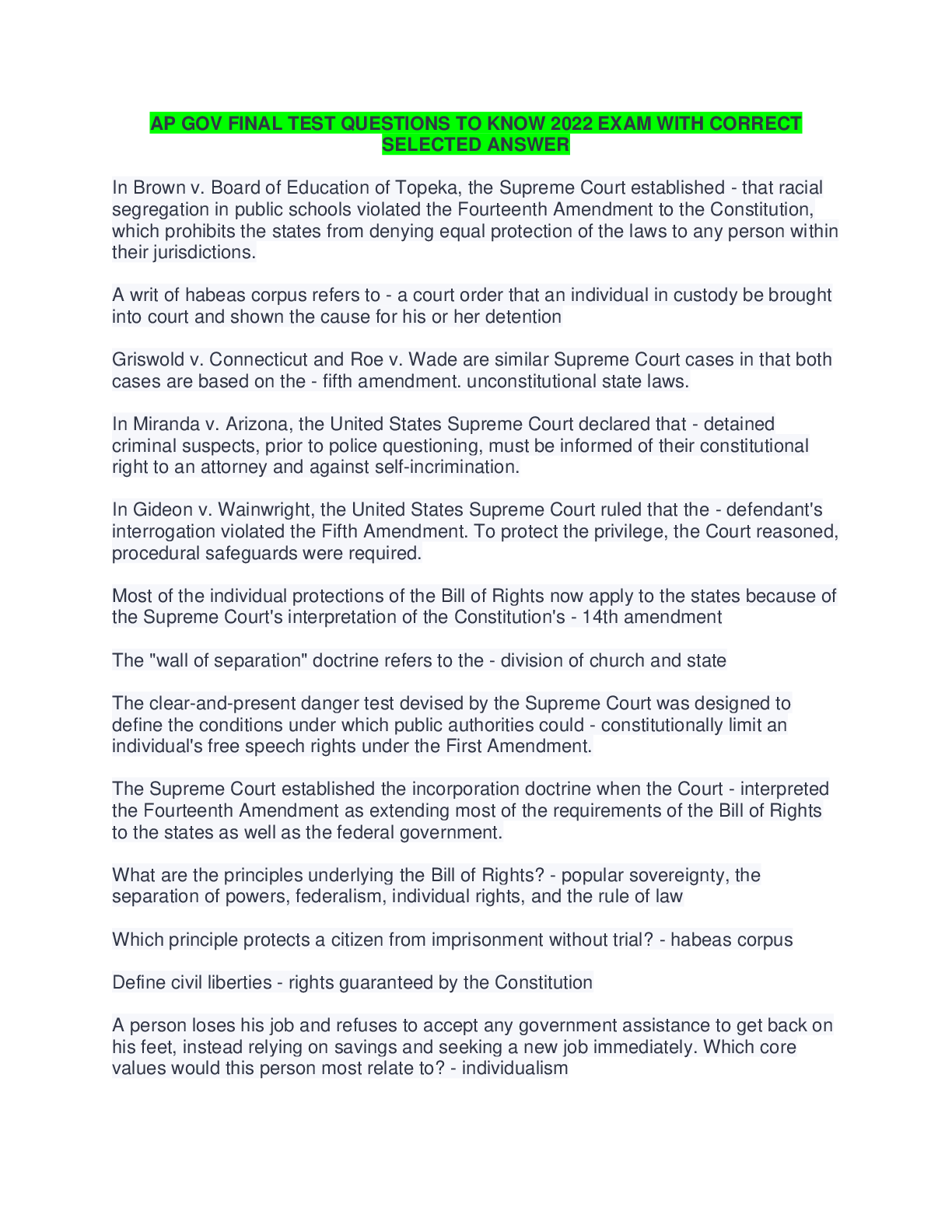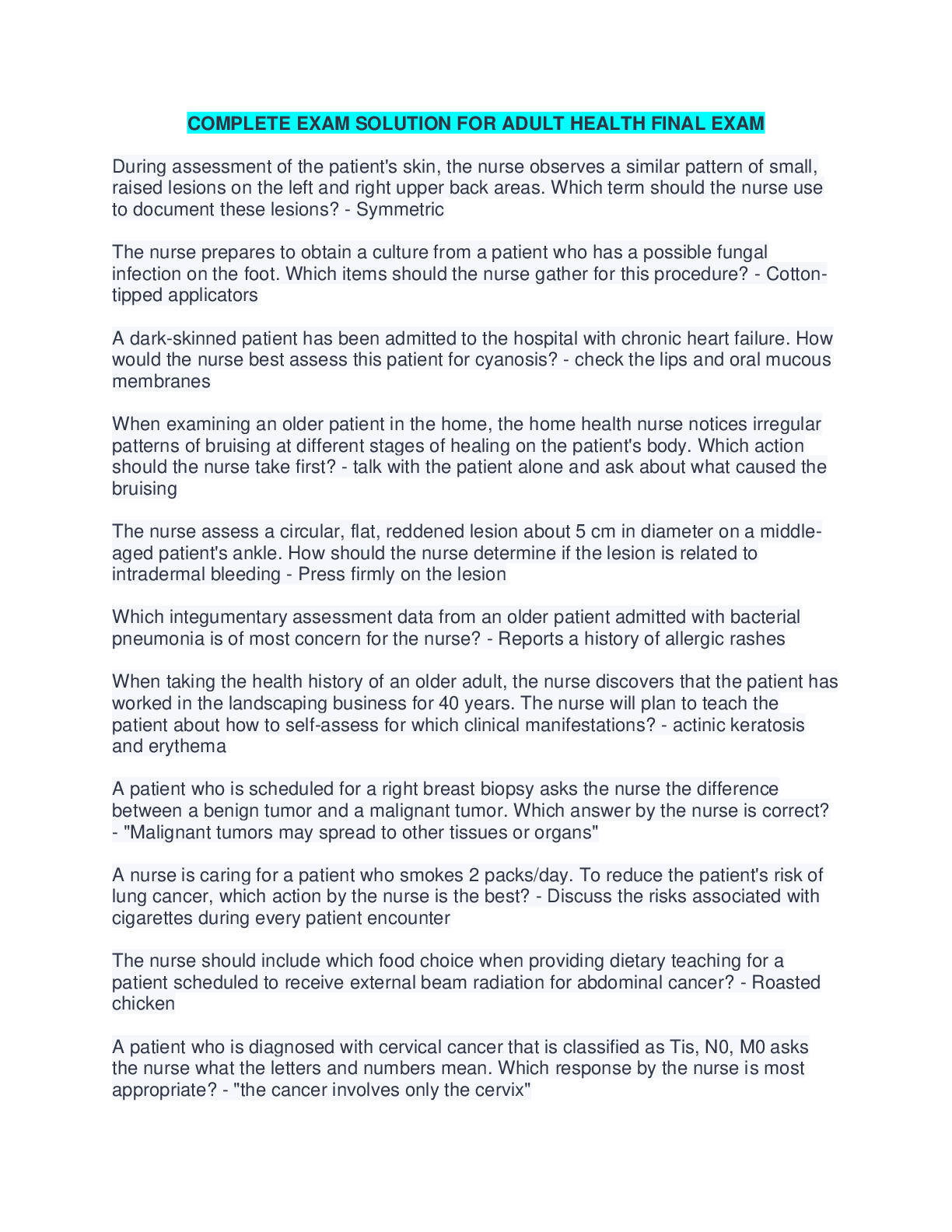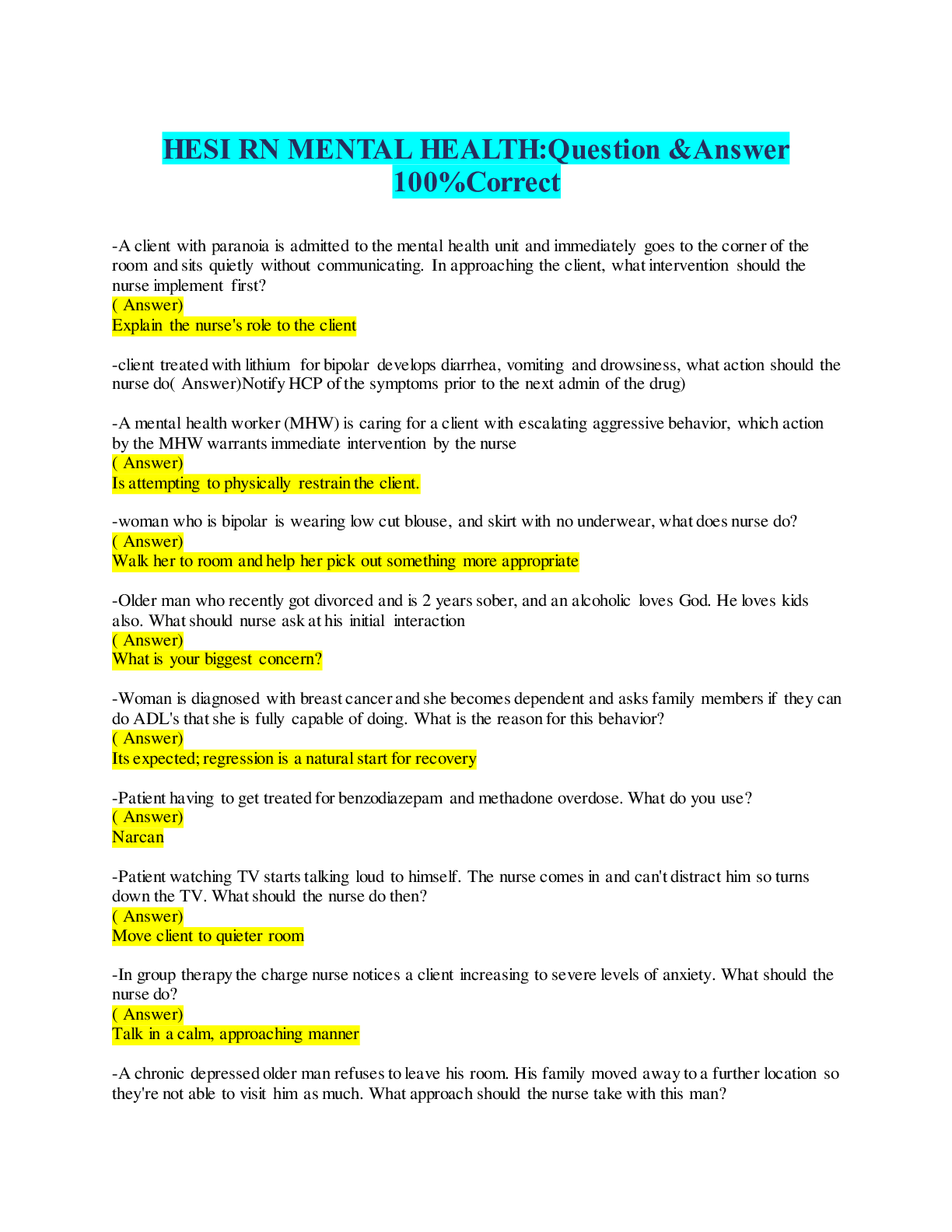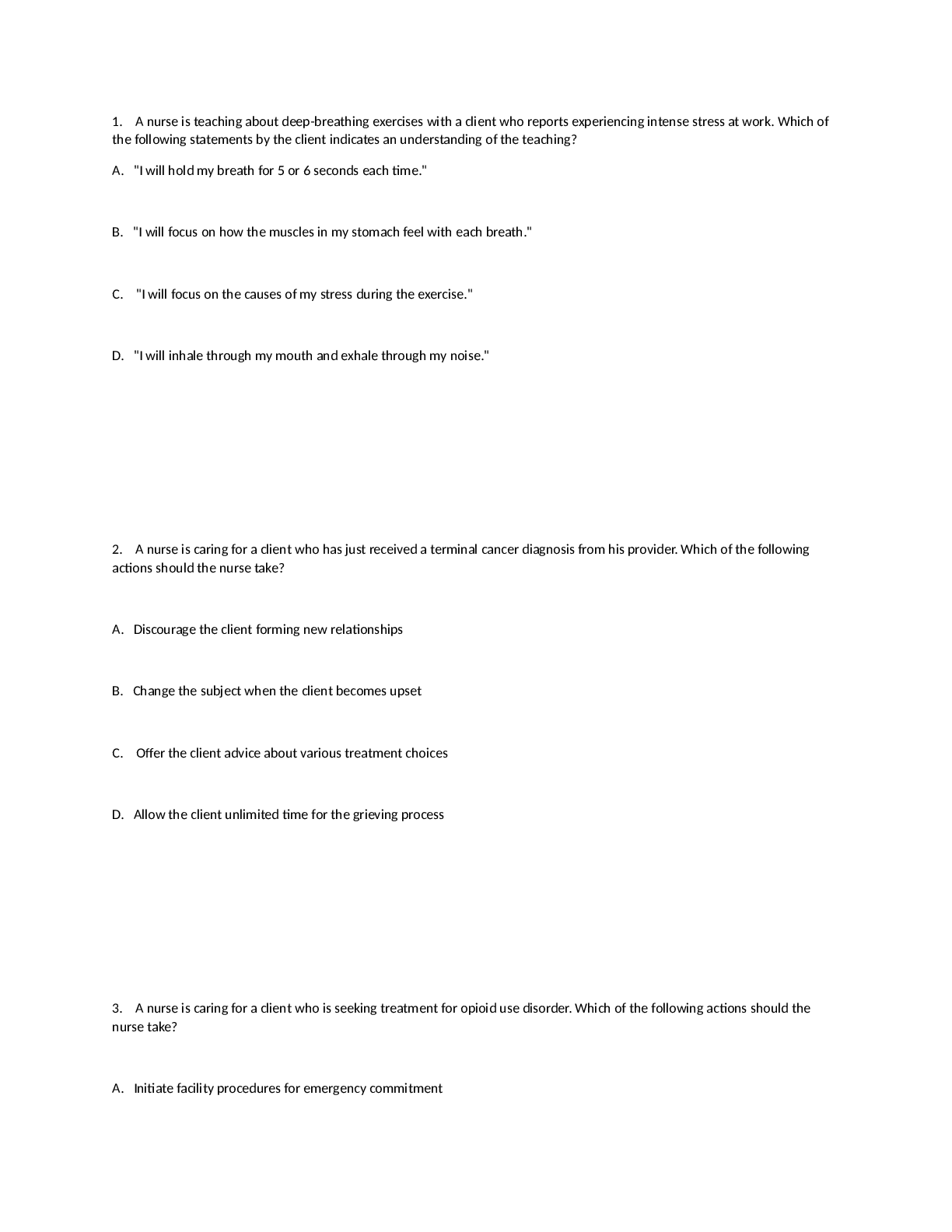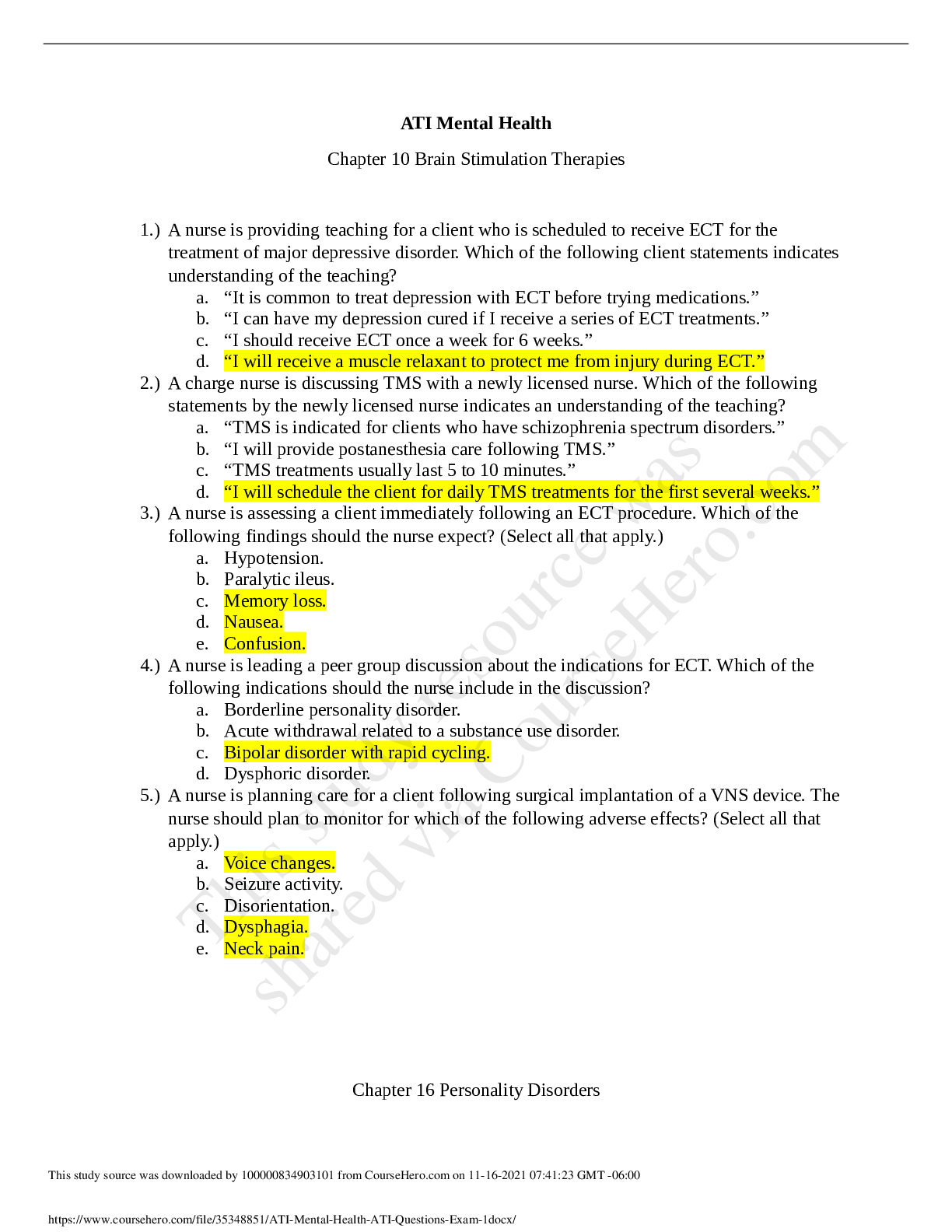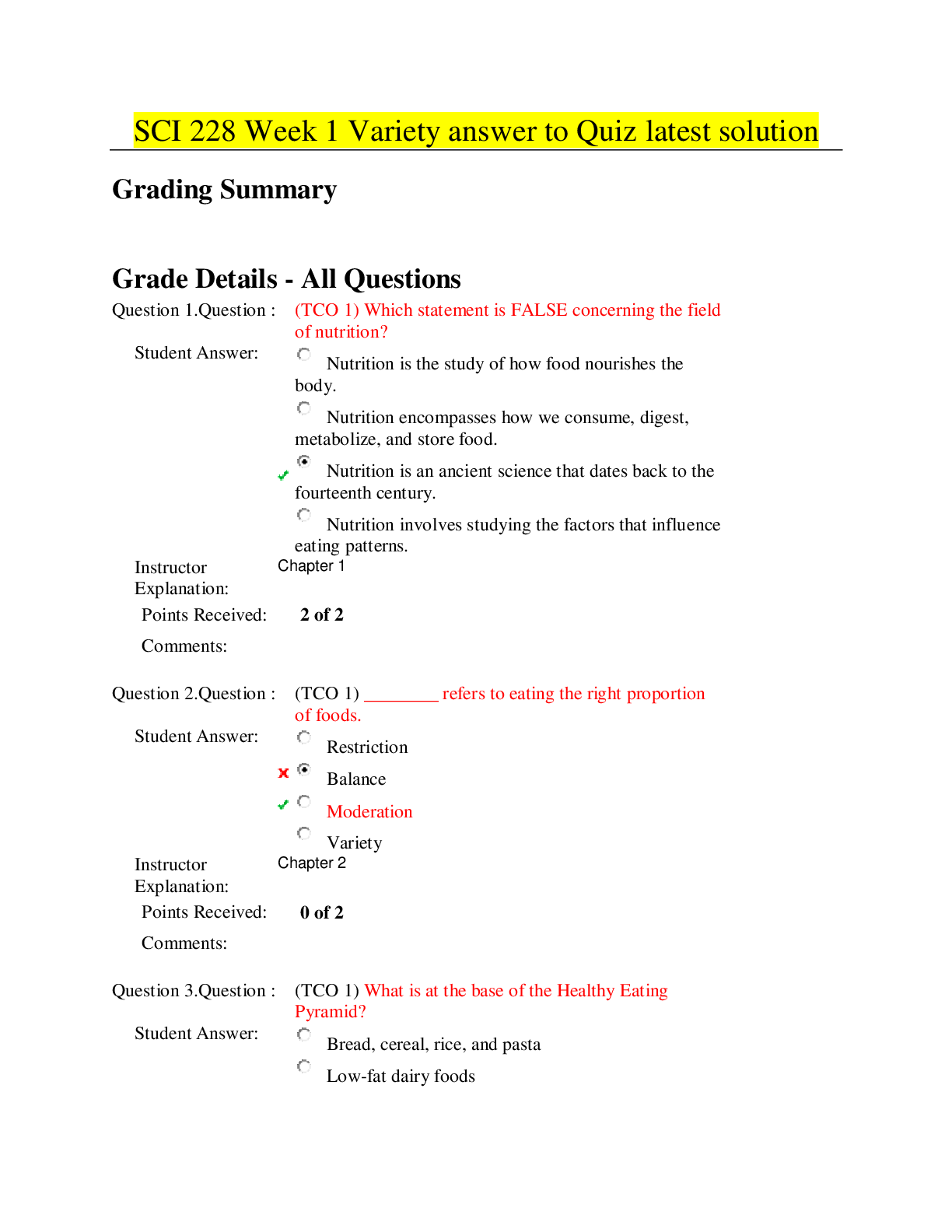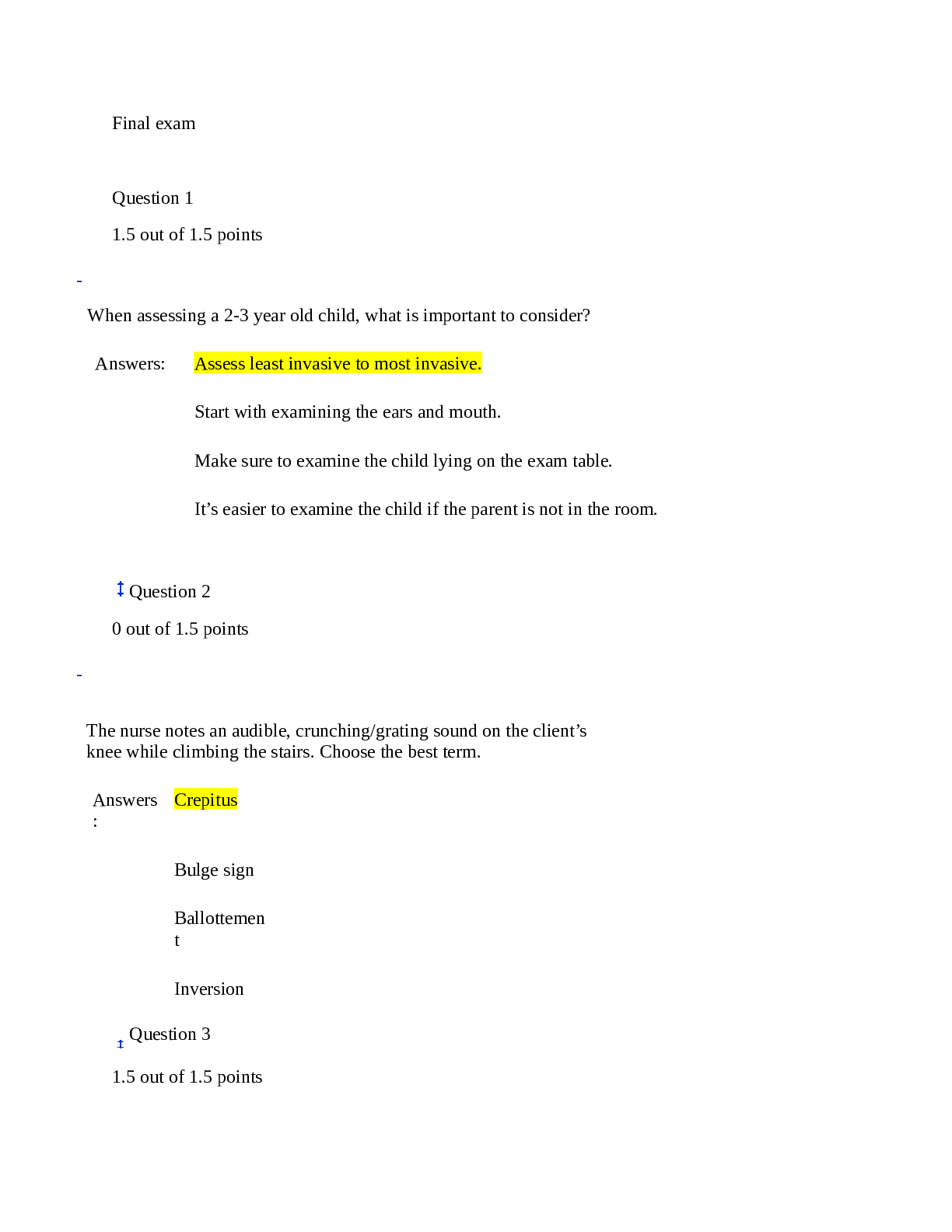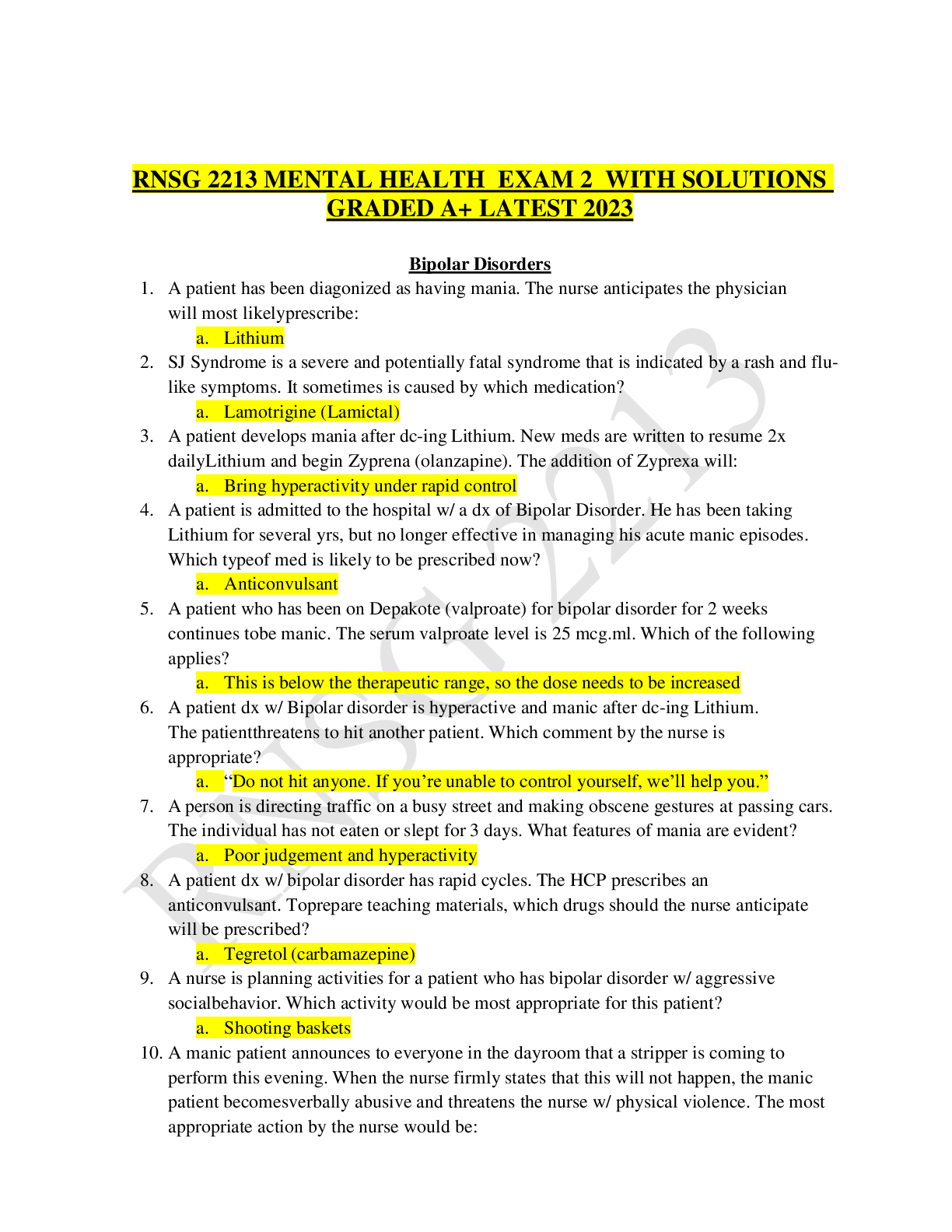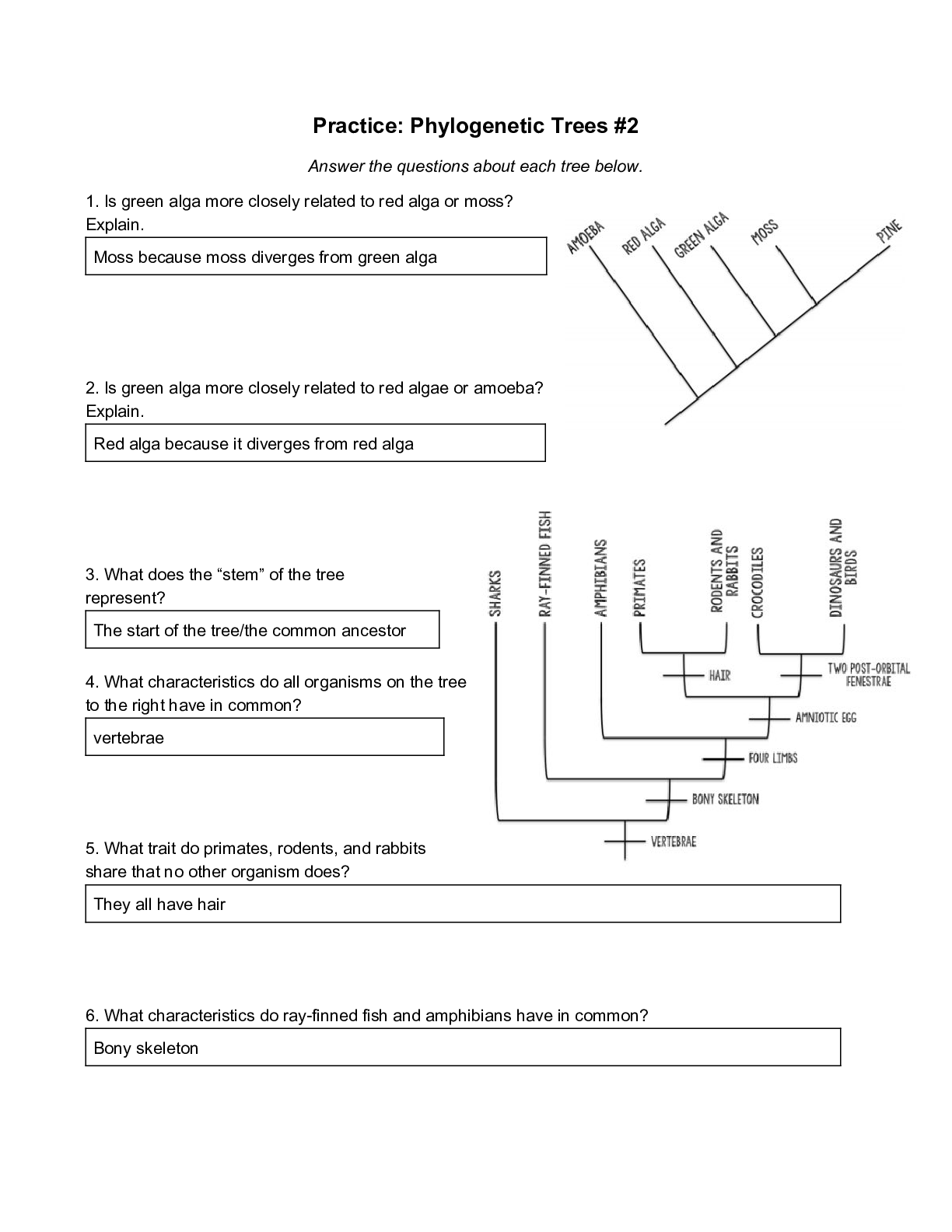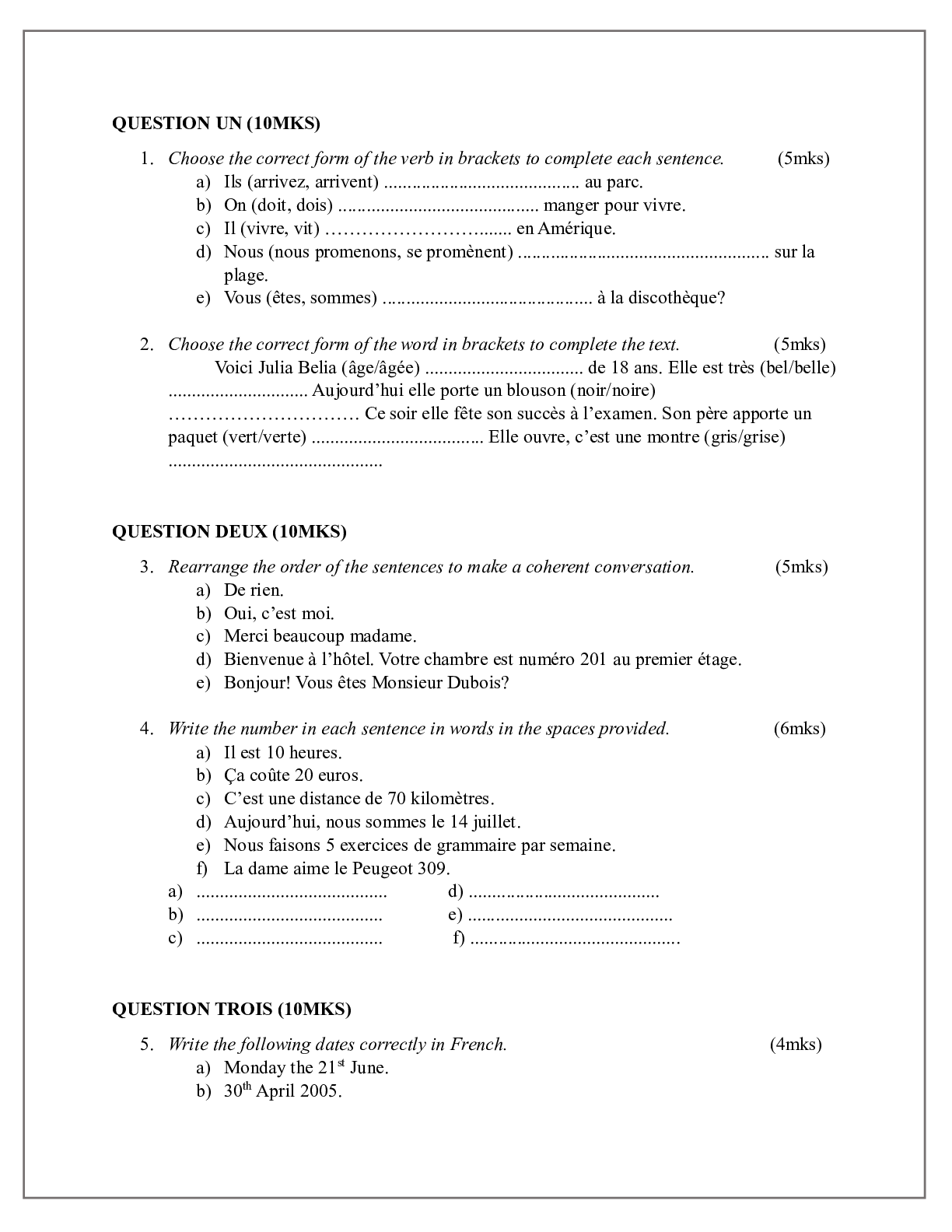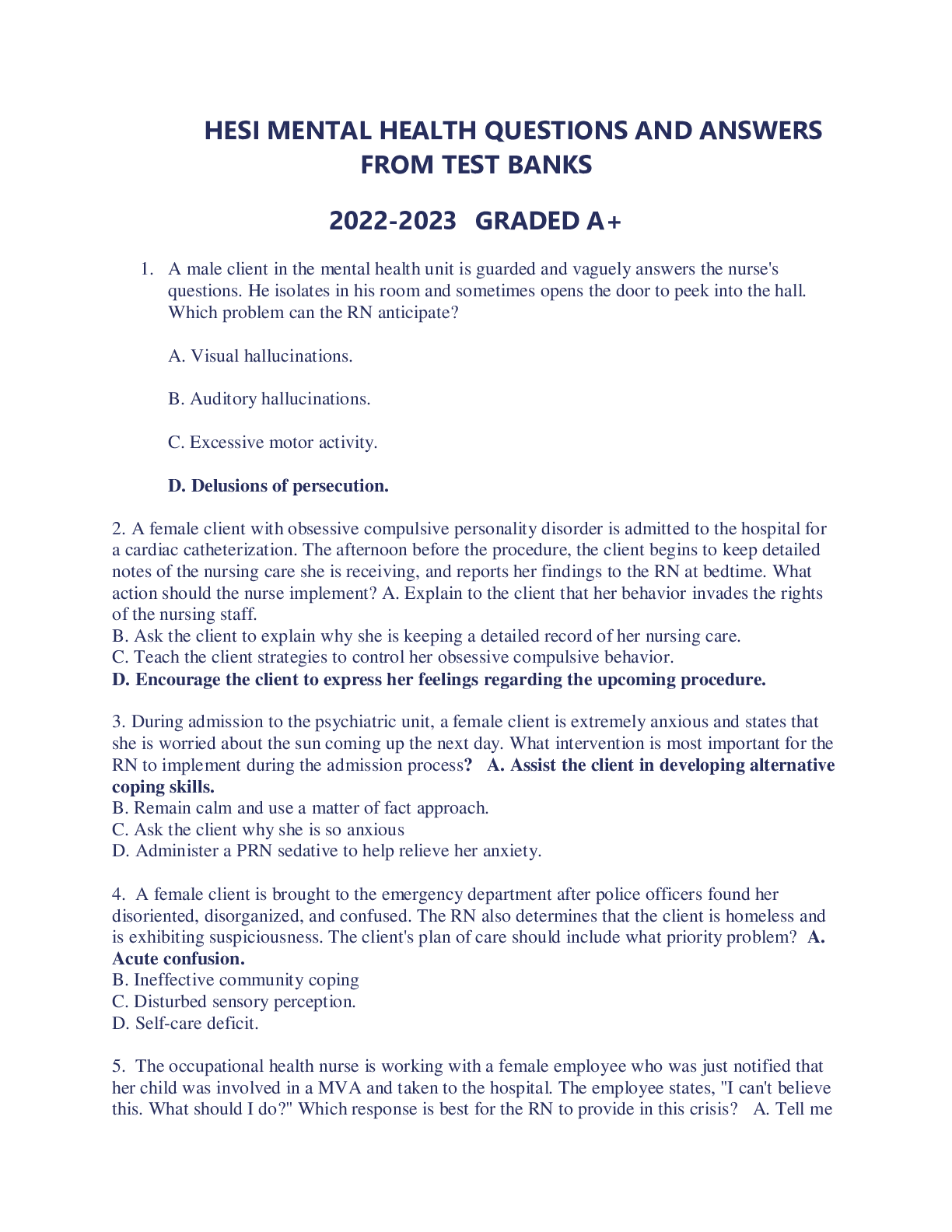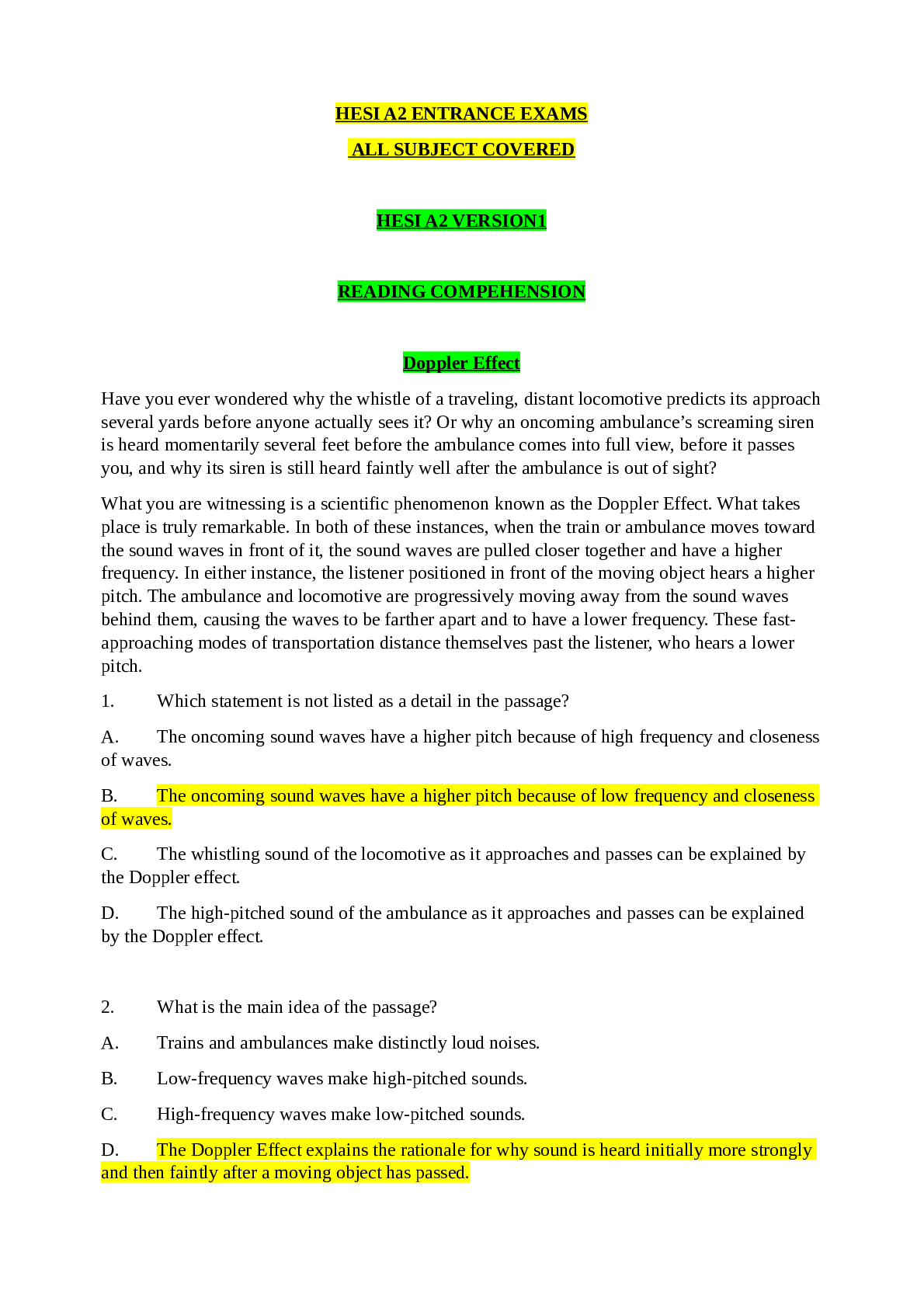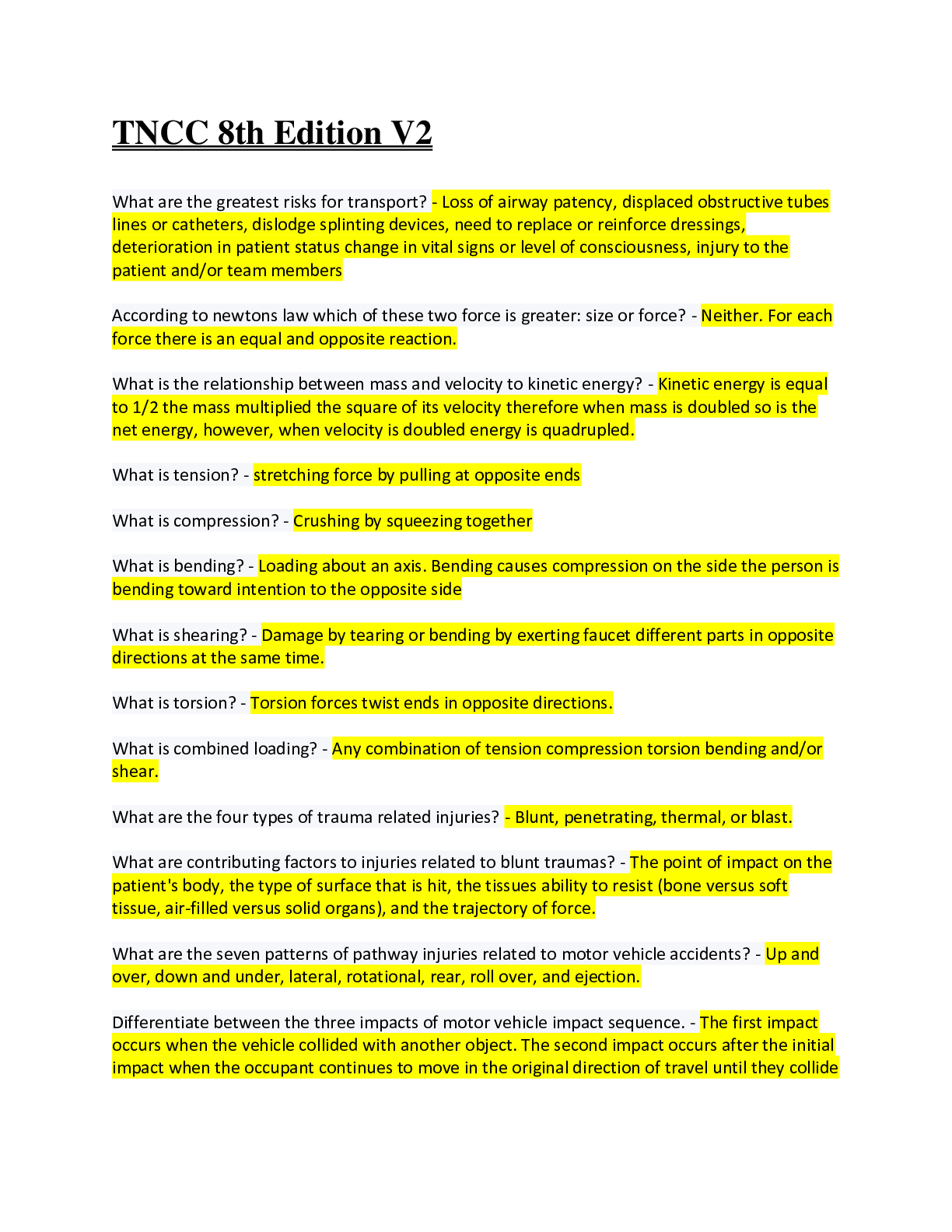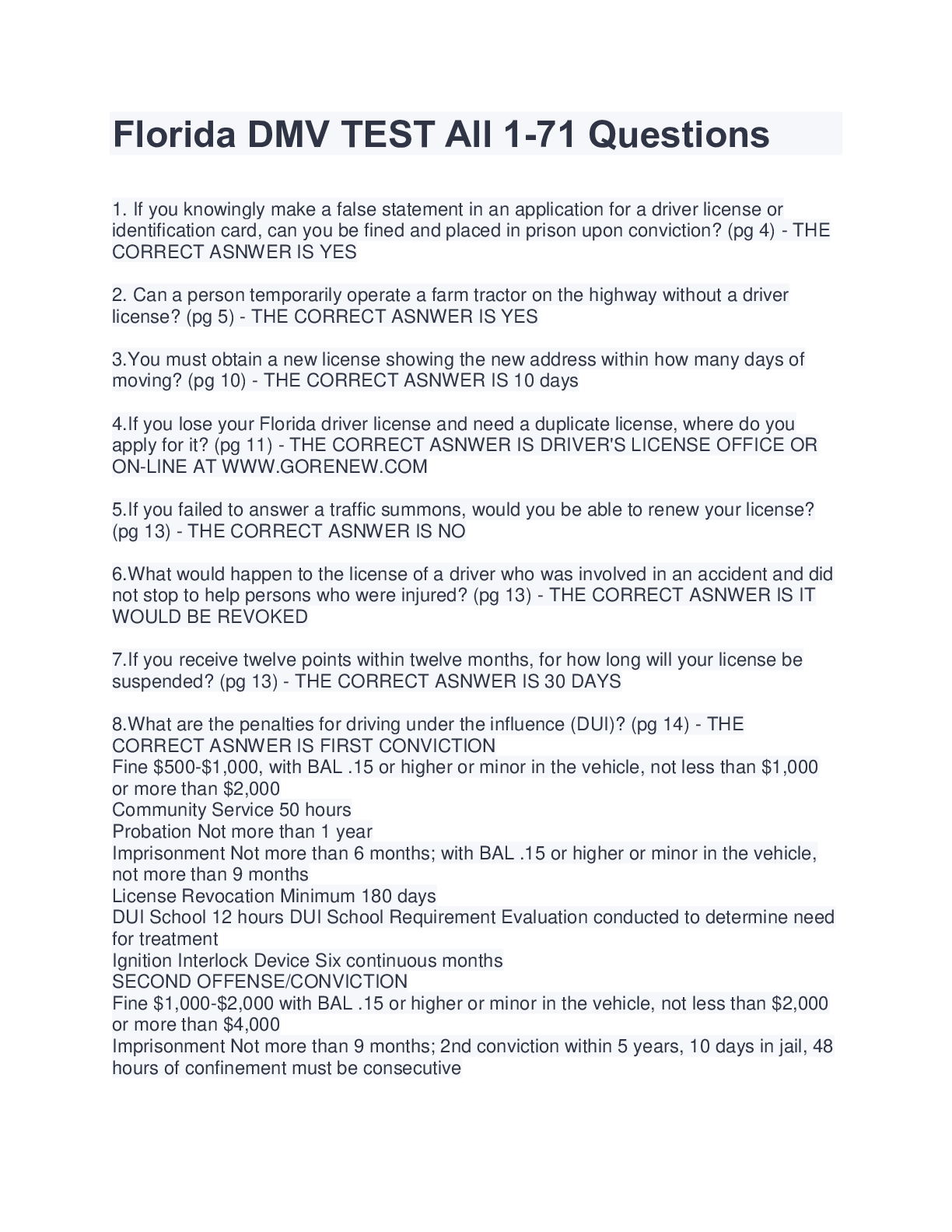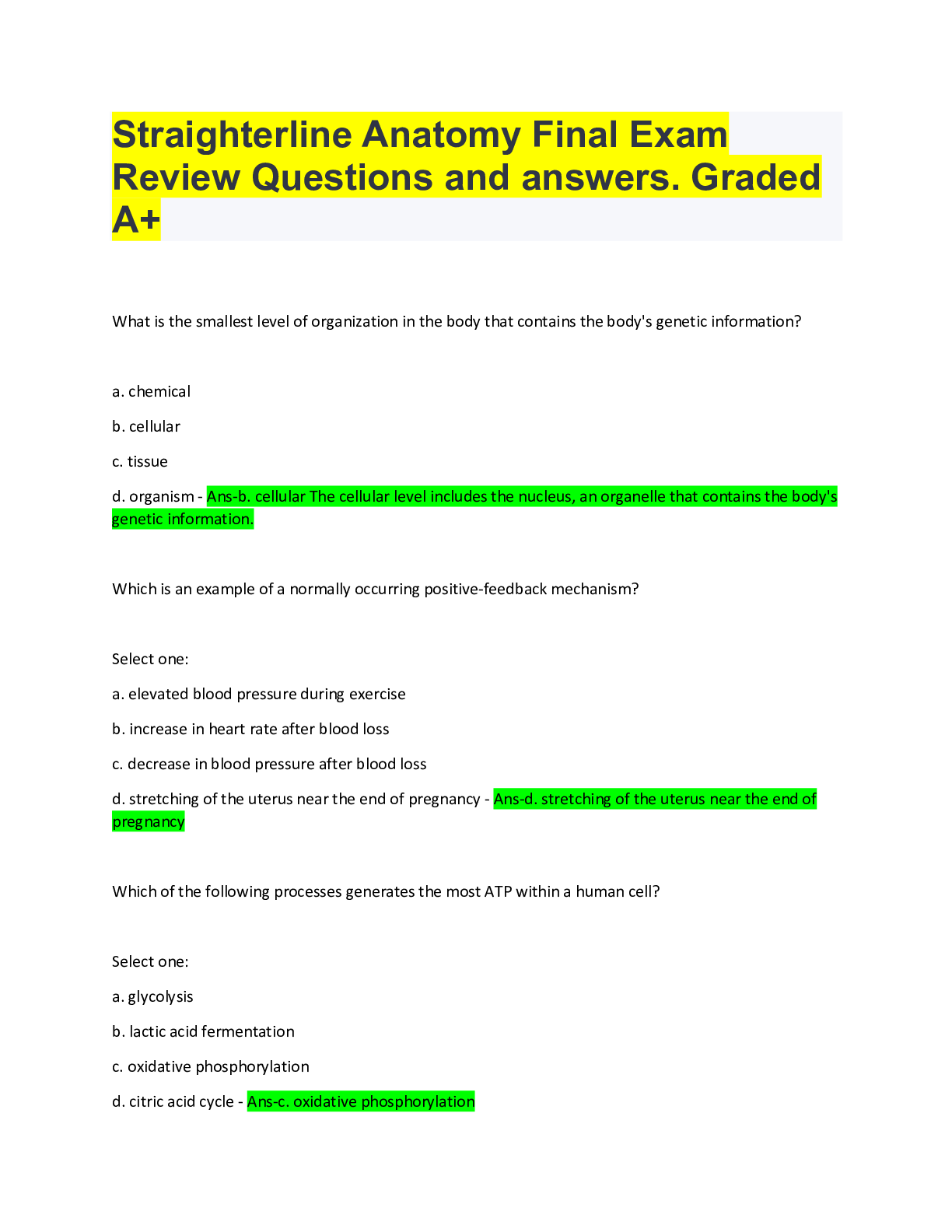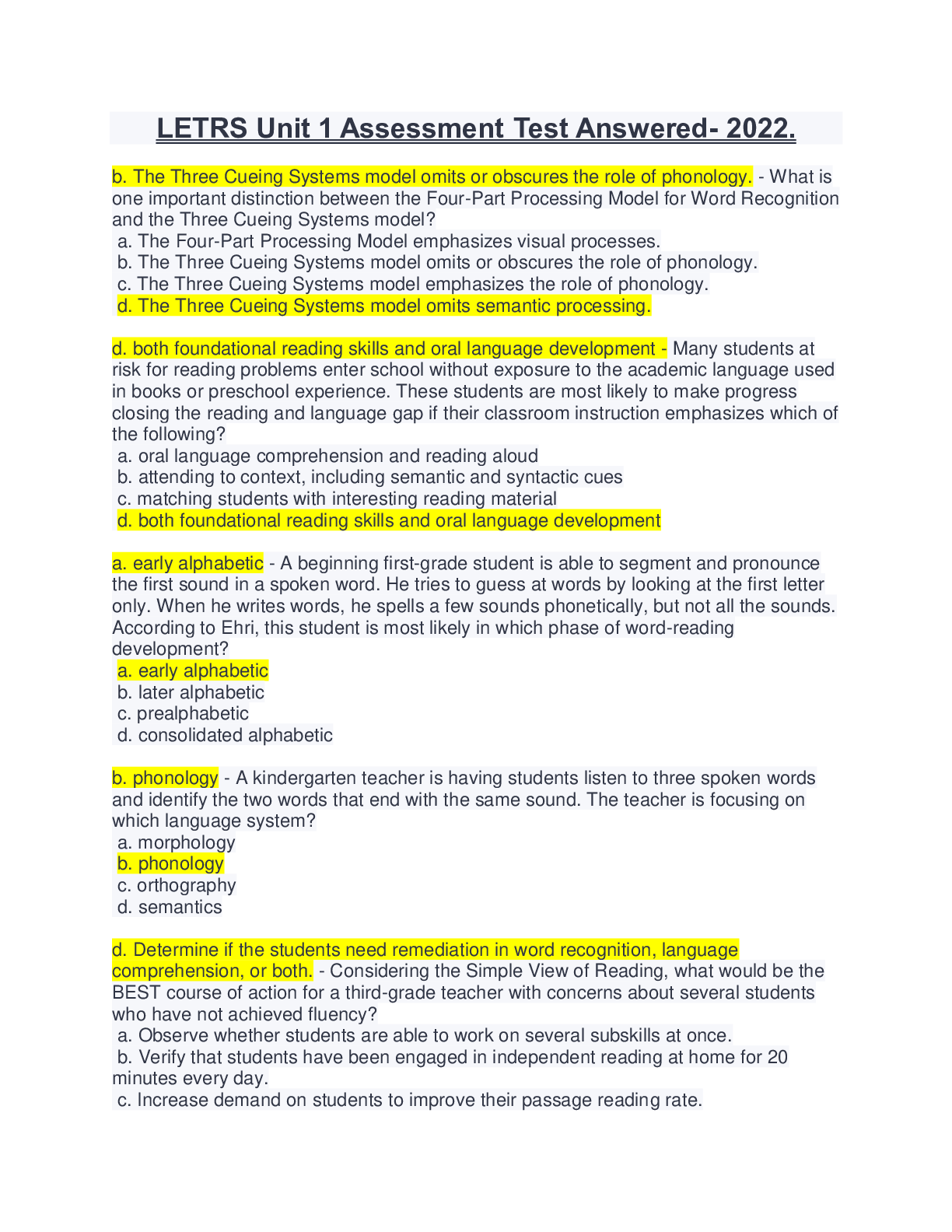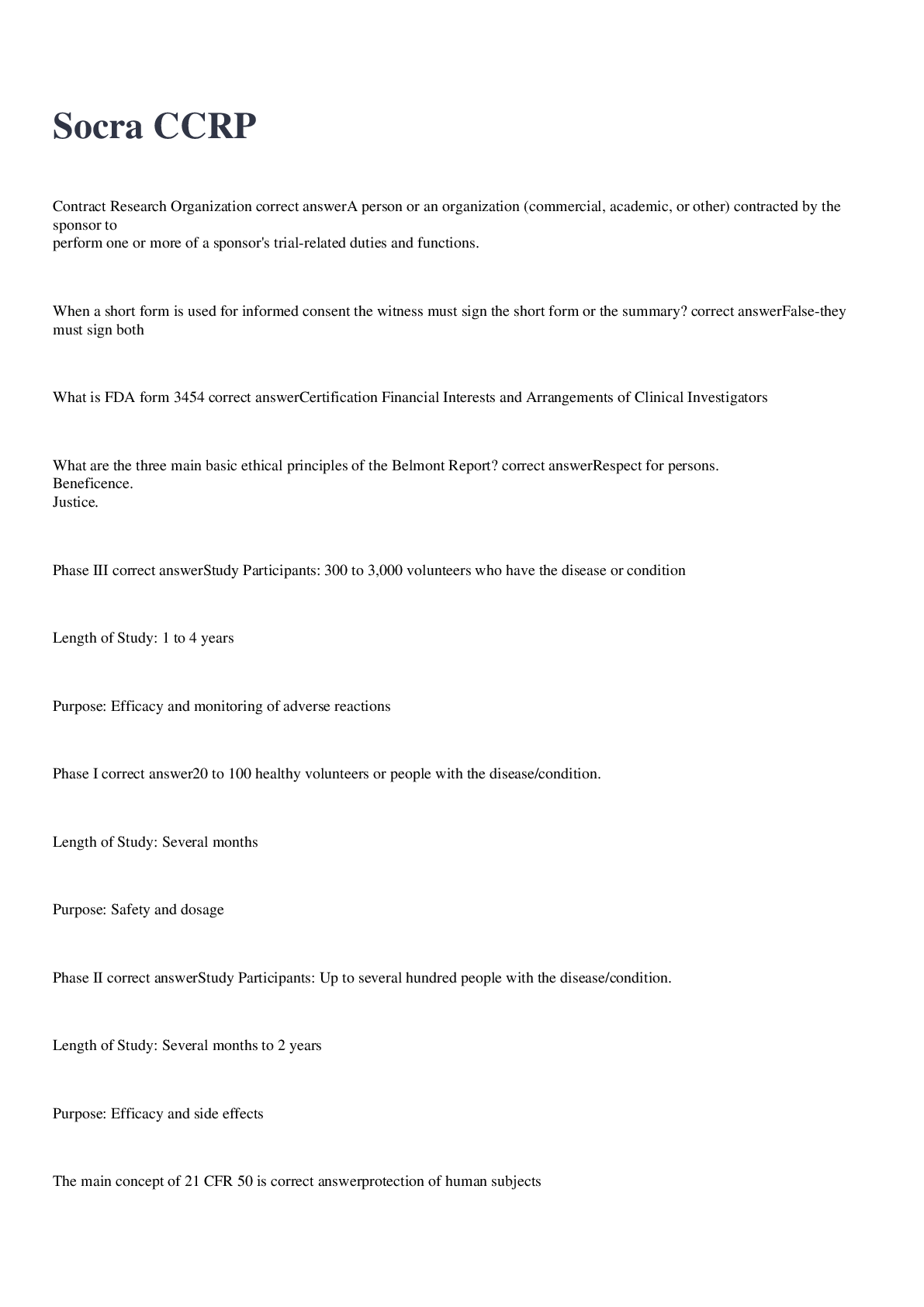HESI RN V4 2018 MENTAL HEALTH EXAM PRACTICE DOCS QUESTIONS AND ANSWERS
Document Content and Description Below
HESI RN V4 2018 MENTAL HEALTH EXAM PRACTICE DOCS QUESTIONS AND ANSWERS 1. The nurse finds the bathroom with feces and urine on the floor 2. Pt with history of alcohol is admitted to the hospital s... tating he feels bugs crawling on his legs 3. Pt taking his medication complains of chest pain 4. Student with anorexia wants to work in the cafeteria 5. Pt taking antipsychotic medications. What else should the nurse stop giving 6. An alcoholic Patient 7. Patient says “I'm going to shoot myself” 8. Note taking for nurses 9. Teaching plan for an abused woman. SELECT ALL 10. A patient with auditory hallucination is shouting out loud 11. Teenager is admitted to the unit for violence. He said he will not talk to his mom. 12. Patient is yelling “I'm the boss” I do what I want, 13. A coworker just found out her son was involved in car accident 14. Patient with severe depression 15. What action by the coworker should the nurse intervene? 16. Question with cognitive therapy 17. Patient is admitted to the unit uses protection 18. The nurse is in therapy and passes out papers to patients about anger control. Patient interrupts and talks about pets 19. Patient checks the locks on the doors and windows 20. Patient who attempted suicide with pulls because his boss fired him. When/how does he demonstrate improvement? 21. Patient with echolalia is bothering others. 22. Patient started yelling in the hallway and acting psychotic PSYCH SPECIALTY HESI 2018 1. A client who is known to abuse drugs is admitted to the psychiatric unit. Which medication should the nurse anticipate administering to a client who is exhibiting benzodiazepine withdrawal symptoms? a. Perphenazine (Trilafon). b. Diphenylhydramine (Benadryl). c. Chlordiazepoxide (Librium). d. Isocarboxazid (Marplan). 2. A client is receiving substitution therapy during withdrawal from benzodiazepines. Which expected outcome statement has the highest priority when planning nursing care? a. Client will not demonstrate cross addiction. b. Co-dependent behaviors will be decreased. c. Excessive CNS stimulation will be reduced. d. Client's level of consciousness will increase. 3. A woman brings her 48-year-old husband to the outpatient psychiatric unit and describes his behavior to the admitting nurse. She states that he has been sleepwalking, cannot remember who he is, and exhibits multiple personalities. The nurse knows that these behaviors are often associated with which condition? a. Dissociative disorder. b. Obsessive-compulsive disorder. c. Panic disorder. d. Post-traumatic stress syndrome. 4. Which diet selection by a depressed client taking tranylcypromine sulfate (Parnate), an MAO inhibitor, indicates to the nurse that the client understands the dietary restrictions imposed by this medication regimen? a. Hamburger, french fries, and chocolate milkshake. b. Liver and onions, broccoli, and decaffeinated coffee. c. Pepperoni and cheese pizza, tossed salad, and soda. d. Roast beef, baked potato with butter, and iced tea. 5. A client who is being treated with lithium carbonate for manic depression begins to develop diarrhea, vomiting, and drowsiness. What action should the nurse take? a. Notify the physician immediately and force fluids. b. Prior to giving the next dose, notify the physician of the symptoms. c. Record the symptoms and continue medication as prescribed. d. Hold the medication and refuse to administer additional amounts of the drug. 6. A male client with schizophrenia is admitted to the mental health unit after abruptly stopping his prescription for ziprasidone (Geodon) one month ago. Which question is most important for the nurse to ask the client 7. Which client statement suggests to the nurse that the client is using the defense mechanism of projection to deal with anxiety related to admission to a psychiatric unit? 8. A female client on a psychiatric unit is sweating profusely while she vigorously does pushups and then runs the length of the corridor several times before crashing in to the furniture in the sitting room. Picking herself up, she begins to toss chairs aside, looking for a red one to sit in. When another client objects to the disturbances, the client shouts," I am the boss here. I do what I want." Which nursing problem best supports these observations 9. A female client engages in repeated checks of door and window locks. Behavior that prevents her form arriving on time and interferes with her ability to function effectively. What action should the nures take? 10. The nurse is preparing medications for a client with disorder and notices that the antipsychotic medication was discontinued several days ago. Which medication should also be discontinued? 11. The nurse is teaching a client about the initiation of a prescribed abstinence therapy using disulfiram (Antabuse). What information should the client acknowledge understanding 12. A male client with bipolar disorder tells the nurse that he needs to "make some deals so that he can improve his retirement savings." Based on this information, which client outcome should the nurse include in the plan of care 13. Teenaged girl self induced vomiting 14. Pt is getting oreiented to the unit and replies “there are no TVs in the room” What is the nurse’s best respond? 15. A male adult is admitted because of an acetaminophen (Tylenol) overdose. After transfer to the mental health unit, the client is told he has liver damage. Which information is most important for the nurse to include in the client's discharge plan? 16. The nurse documents the mental status of a female client who has been hospitalized for several days by court order, The client states, "I don't need to be here" and tells the nurse that she believes that the television talks to her. The nurse should document these assessment findings in which section of the mental status exam? - 17. A client who has agoraphobia (a fear of crowds) is beginning desensitization with the therapist, and the nurse is reinforcing the process. Which intervention has the highest priority for this client's plan of care? 18. ECT therapy is not working, pt is non responsive to treatment what question should the nurse ask? 19. adolescent teen interrupts group about pets at home 20. depressed pt in bed all weekend, nuse finds pt still in bed on her shift, what is the best action to take? 21. postpartum depression Sign & Symptoms (3) 22. ECT pre-treatment teaching 23. A MHW mental health worker is caring for a client with escalating aggression behavior, what action by the MHW warrants immediate intervention by the nurse 24. Client who refuses antipsychotic medication disrupt group activities nurse decides client needs constant observation based on? 25. Recurrent negative symptoms of chronic schizophrenia and medication risperdal. walks laterally contracted position, something has made his body contort 26. depression remains in bed most of the day, declines activities and refuses meals 27. Victim of intimate partner violence what 3 things should you do?SELECT ALL THAT APPLY (only 3 correct answers) 28. patient taking sertraline (zoloft) for postpartum depression, nursing teaching 29. client sitting in corner of day room during admission assessment, what nursing action 30. Psychomotor retardation, hypersomnia, and amotivation; what nursing intervention? - 31. Client makes a statement I feel like im going to die, what level of Anxiety is it? - 32. 32.TOOL assessment 33. What documentation to include for abuse pts 34. Male nurse swings on female nurse for pushing him out of the way of a gurney. What is the kind of abuse? 35. Anorexic pt asking to work as a cook what is the nurse best response? 36. Client overdose on acetaminophen (Tylenol). What should the nurse monitor next? 37. Client is increasing getting aggressive 38. Angry pt because of coworkers, then a car accident, what is the nurse best response? 39. The nurse is teaching a pt about disulfiram (Antabuse) 40. Nurse is teaching ways to help pt promote self-esteem, what should the nurse teach? Select all that apply (only 3 correct answers) 41. Male pt loss his love one, what priority nursing problem? 42. On admission to a residential care facility, an elderly female client tells the nurse that she enjoys cooking, quilting, and watching television. Twenty-four HR after admission, the nurse notes that the client is withdrawn and isolated. It is best for the nurse to encourage this client to become involved in which activity? A) Clean the unit kitchen cabinets. B) Participate in a group quilting project. C) Watch television in the activity room. D) Bake a cake for a resident's birthday. 43. A male adolescent is admitted with bipolar disorder after being released from jail for assault with a deadly weapon. When the nurse asks the teen to identify his reason for the assault, he replies, "Because he made me mad!" Which goal is best for the nurse to include in the client's plan of care? The client will A) outline methods for managing anger. B) control impulsive actions toward self and others. C) verbalize feelings when anger occurs. D) recognize consequences for behaviors exhibited. 44. A 35-year-old male client who has been hospitalized for two weeks for chronic paranoia continues to state that someone is trying to steal his clothing. Which action should the nurse implement? A) Encourage the client to actively participate in assigned activities on the unit. B) Place a lock on the client's closet. C) Ignore the client's paranoid ideation to extinguish these behaviors. D) Explain to the client that his suspicions are false. 45. A nurse working on a mental health unit receives a community call from a person who is tearful and states, "I just feel so nervous all of the time. I don't know what to do about my problems. I haven't been able to sleep at night and have hardly eaten for the past 3 or 4 days." The nurse should initiate a referral based on which assessment? A) Altered thought processes. B) Moderate levels of anxiety. C) Inadequate social support. D) Altered health maintenance. 46. A child is brought to the emergency room with a broken arm. Because of other injuries, the nurse suspects the child may be a victim of abuse. When the nurse tries to give the child an injection, the child's mother becomes very loud and shouts, "I won't leave my son! Don't you touch him! You'll hurt my child!" What is the best interpretation of the mother's statements? The mother is A) regressing to an earlier behavior pattern. B) sublimating her anger. C) projecting her feelings onto the nurse. D) suppressing her fear. 47. An anxious client expressing a fear of people and open places is admitted to the psychiatric unit. What is the most effective way for the nurse to assist this client? A) Plan an outing within the first week of admission. B) Distract her whenever she expresses her discomfort about being with others. C) Confront her fears and discuss the possible causes of these fears. D) Accompany her outside for an increasing amount of time each day. 48. The nurse suspects child abuse when assessing a 3-year-old boy and noticing several small, round burns on his legs and trunk that might be the result of cigarette burns. Which parental behavior provides the greatest validation for such suspicions? A) The parents' explanation of how the burns occurred is different from the child's explanation of how they occurred. B) The parents seem to dismiss the severity of the child's burns, saying they are very small and have not posed any problem. C) The parents become very anxious when the nurse suggests that the child may need to be admitted for further evaluation. D) The parents tell the nurse that the child was burned in a house fire which is incompatible with the nurse's observation of the type of burn. 49. The nurse is planning care for a 32-year-old male client diagnosed with HIV infection who has a history of chronic depression. Recently, the client's viral load has begun to increase rather than decrease despite his adherence to the HIV drug regimen. What should the nurse do first while taking the client's history upon admission to the hospital? A) Determine if the client attends a support group weekly. B) Hold all antidepressant medications until further notice. C) Ask the client if he takes St. John's Wort routinely. D) Have the client describe any recent changes in mood. 50. A 35-year-old male client on the psychiatric ward of a general hospital believes that someone is trying to poison him. The nurse understands that a client's delusions are most likely related to his A) early childhood experiences involving authority issues. B) anger about being hospitalized. C) low self-esteem. D) phobic fear of food. 51. The nurse plans to help an 18-year-old female mentally retarded client ambulate the first postoperative day after an appendectomy. When the nurse tells the client it is time to get out of bed, the client becomes angry and tells the nurse, "Get out of here! I'll get up when I'm ready!" Which response is best for the nurse to make? A) Your healthcare provider has prescribed ambulation on the first postoperative day. B) You must ambulate to avoid complications which could cause more discomfort than ambulating. C) I know how you feel. You're angry about having to ambulate, but this will help you get well. D) I'll be back in 30 minutes to help you get out of bed and walk around the room. 52. A client is admitted with a diagnosis of depression. The nurse knows that which characteristic is most indicative of depression? A) Grandiose ideation. B) Self-destructive thoughts. C) Suspiciousness of others. D) A negative view of self and the future. 53. A woman brings her 48-year-old husband to the outpatient psychiatric unit and describes his behavior to the admitting nurse. She states that he has been sleepwalking, cannot remember who he is, and exhibits multiple personalities. The nurse knows that these behaviors are often associated with A) dissociative disorder. B) obsessive-compulsive disorder. C) panic disorder. D) post-traumatic stress syndrome. 54. A 65-year-old female client complains to the nurse that recently she has been hearing voices. What question should the nurse ask this client first? A) Do you have problems with hallucinations? B) Are you ever alone when you hear the voices? C) Has anyone in your family had hearing problems? D) Do you see things that others cannot see? [Show More]
Last updated: 1 year ago
Preview 1 out of 10 pages
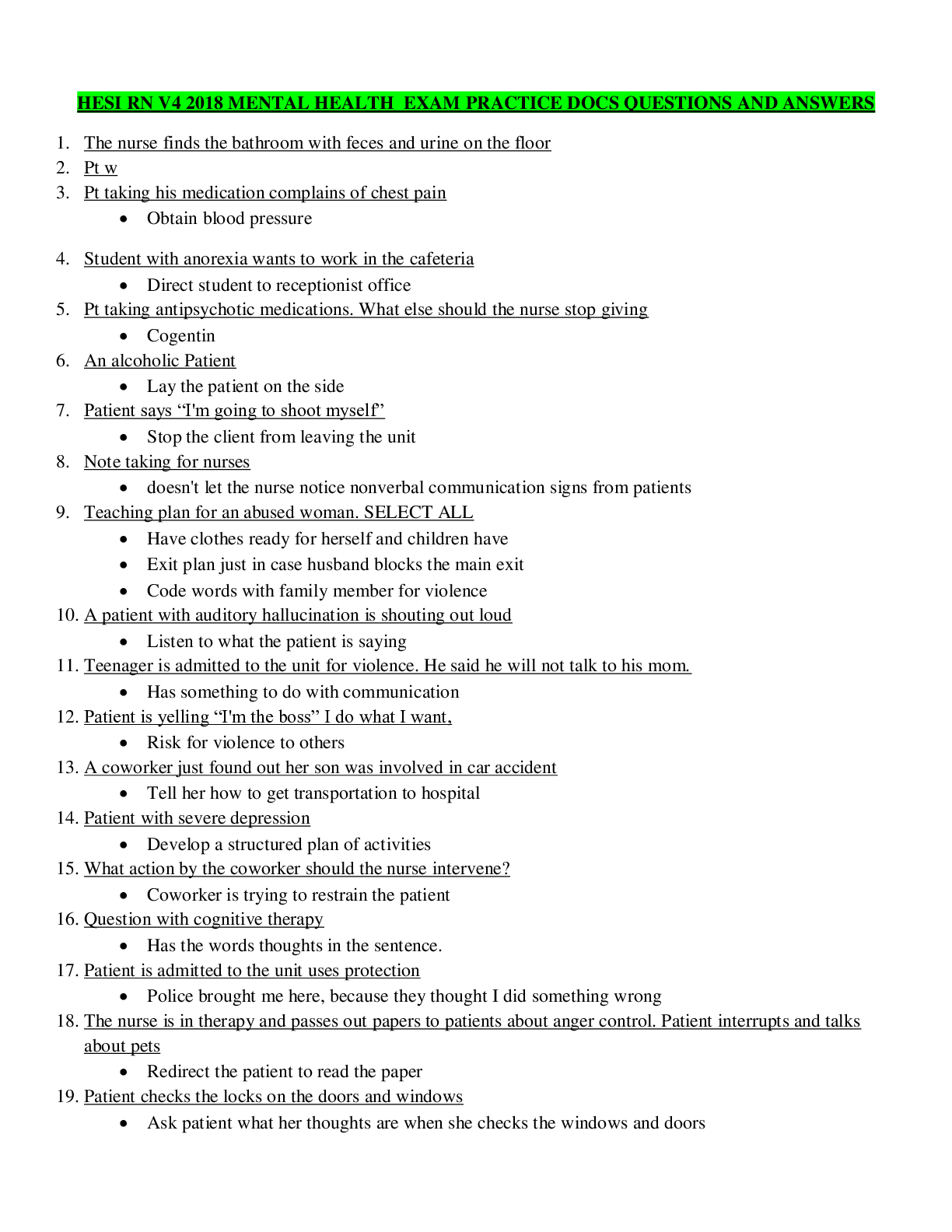
Reviews( 0 )
Document information
Connected school, study & course
About the document
Uploaded On
Jan 11, 2021
Number of pages
10
Written in
Additional information
This document has been written for:
Uploaded
Jan 11, 2021
Downloads
0
Views
57

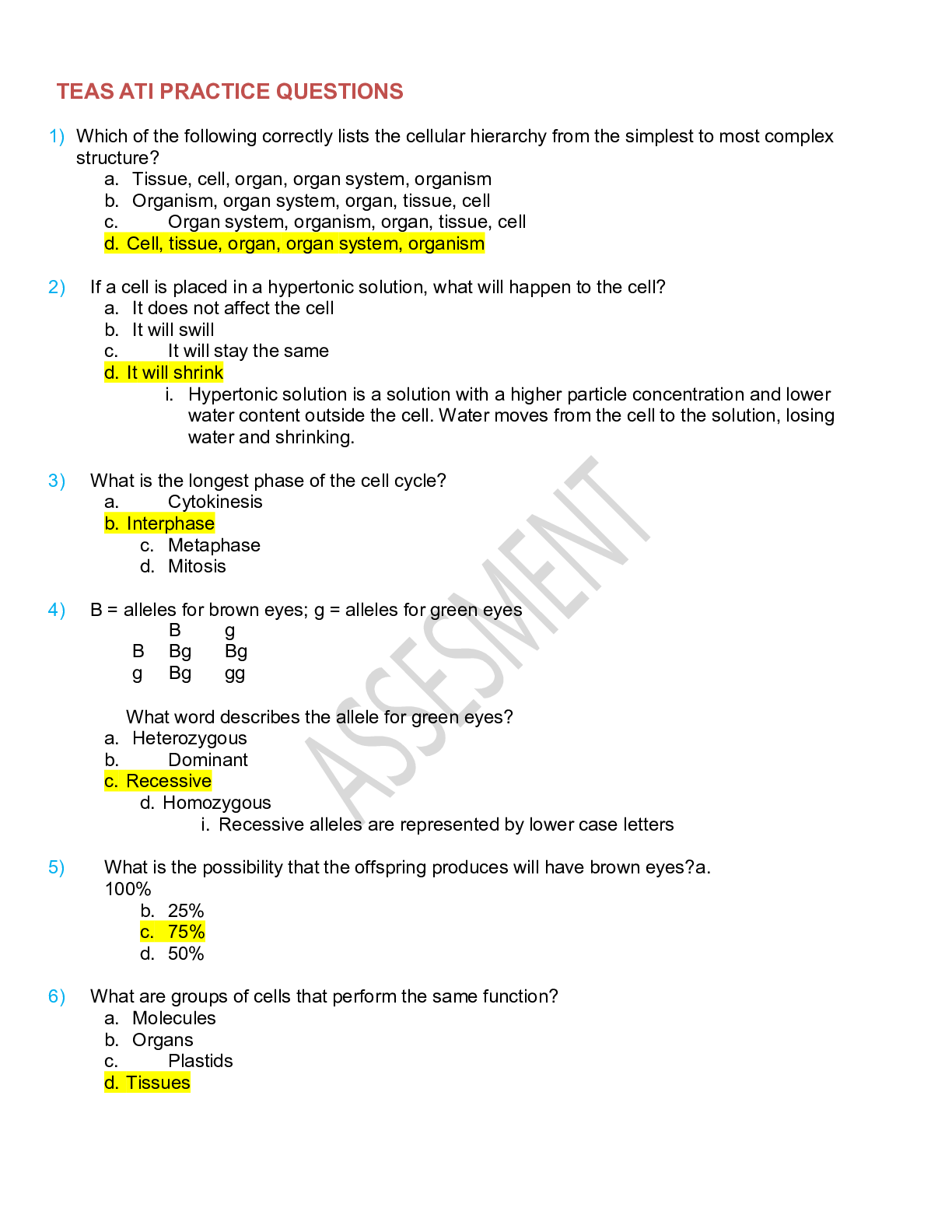
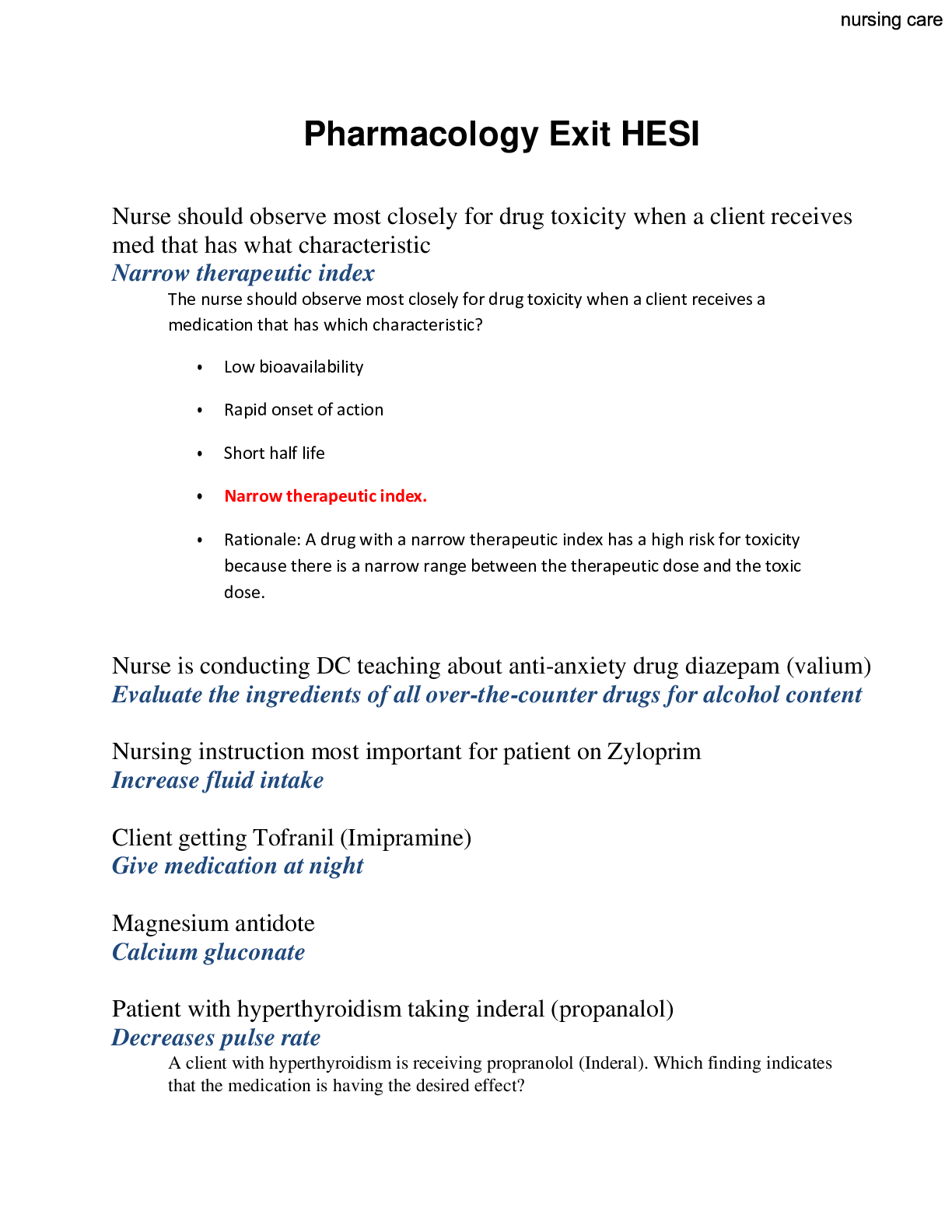
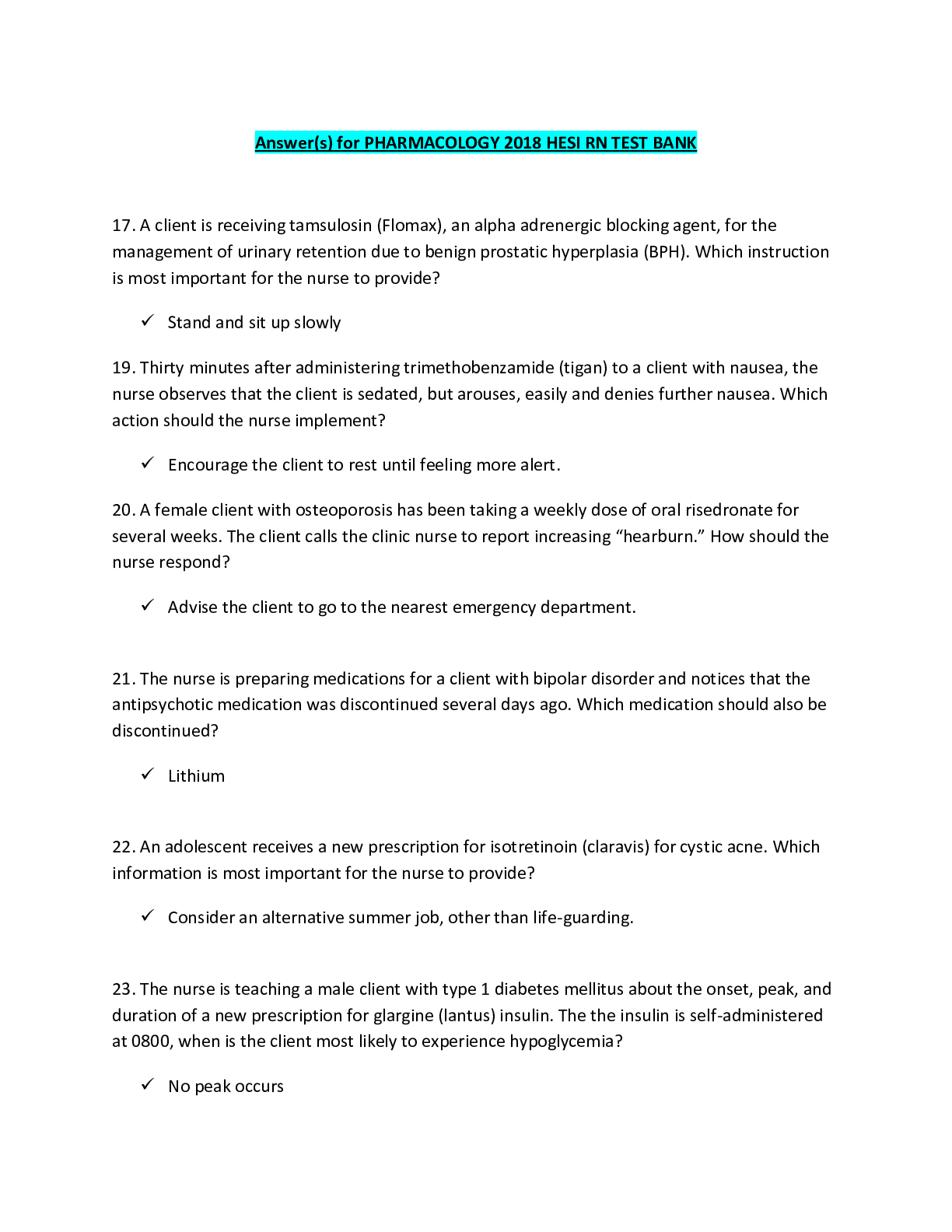
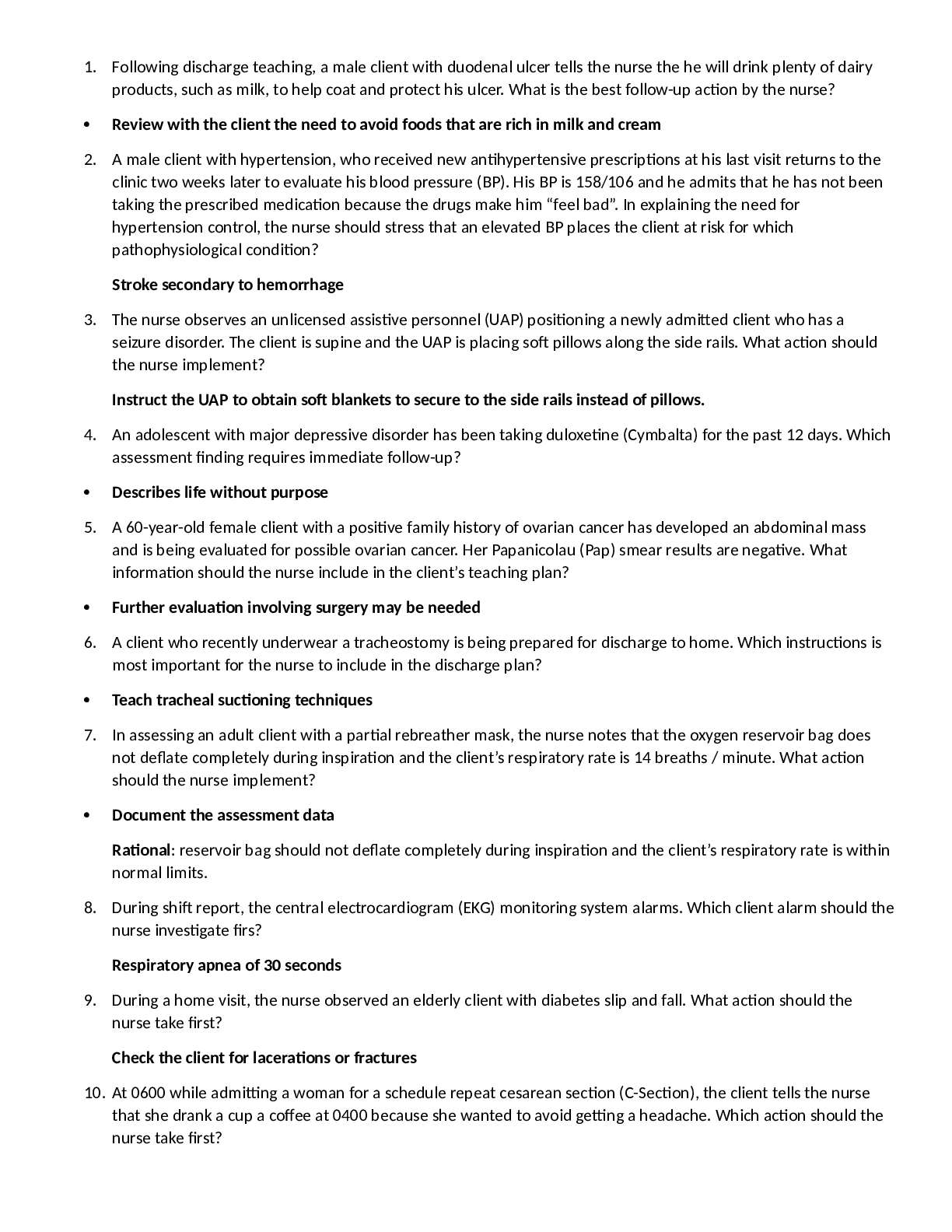
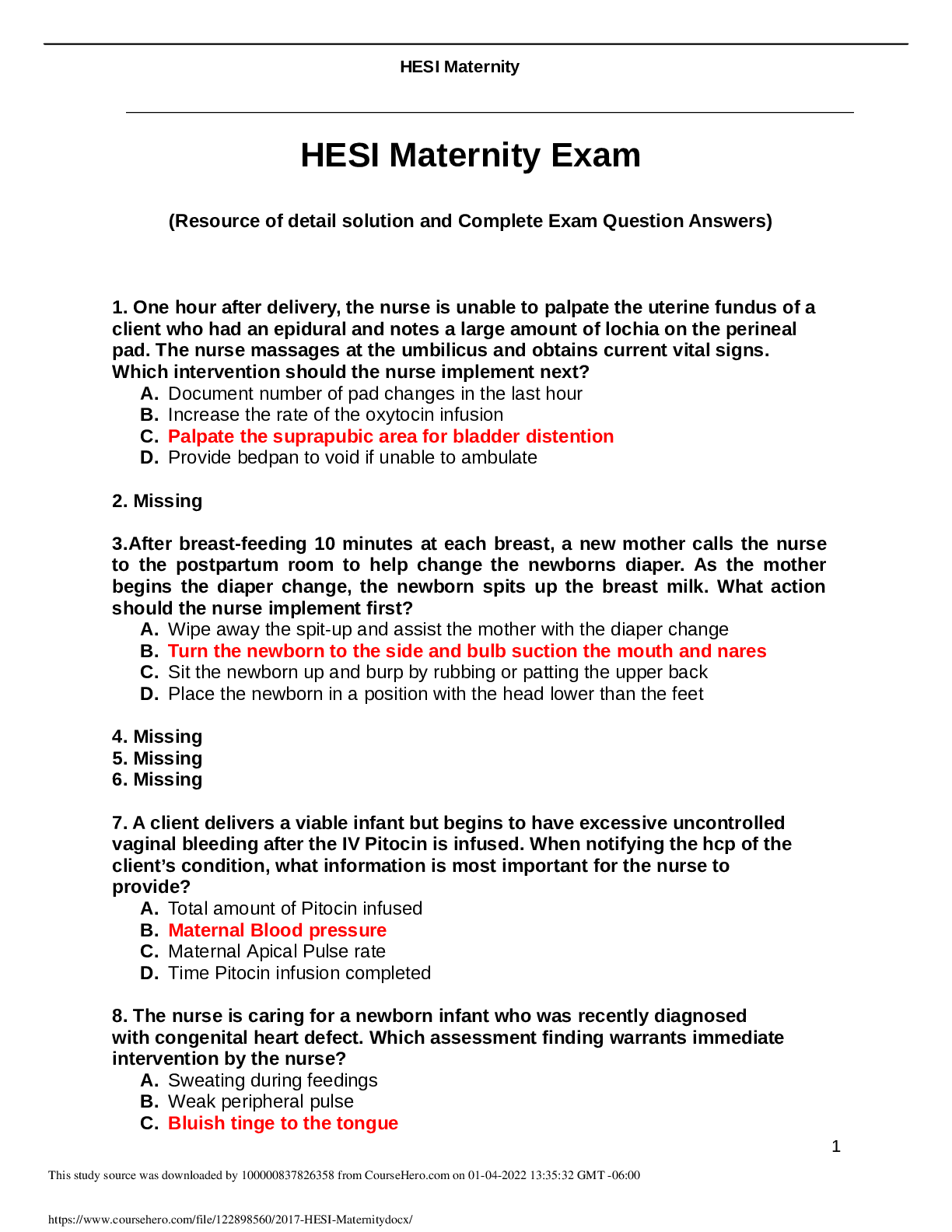
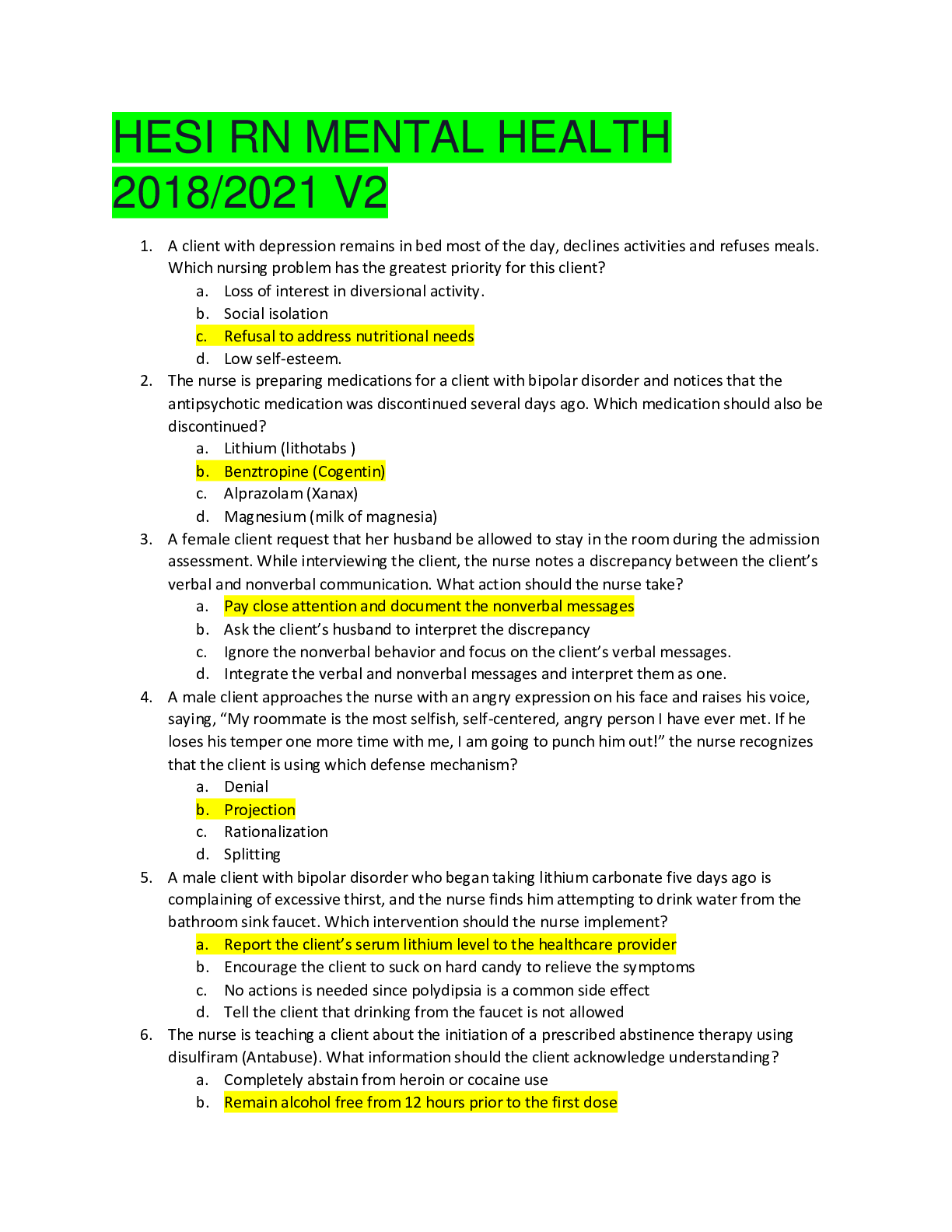
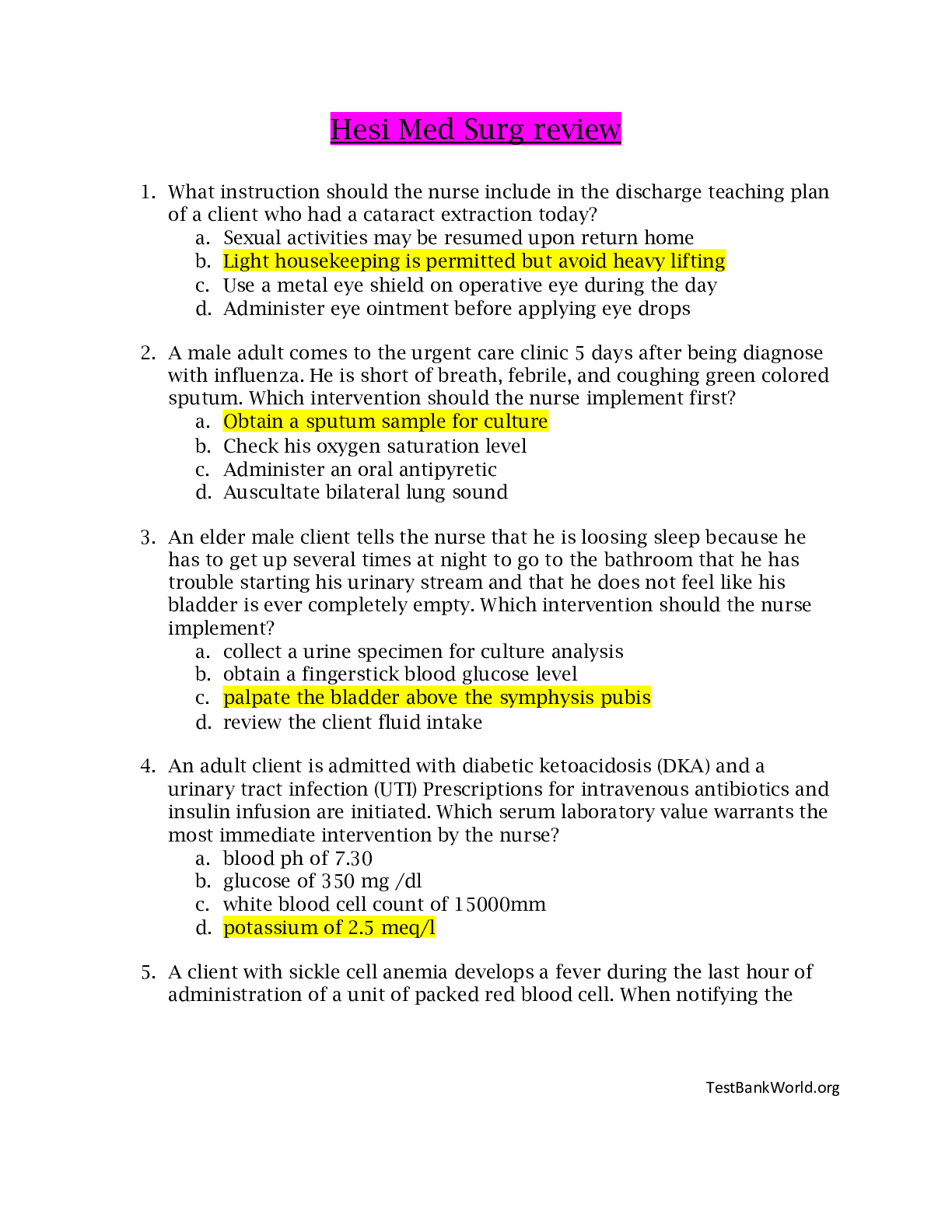
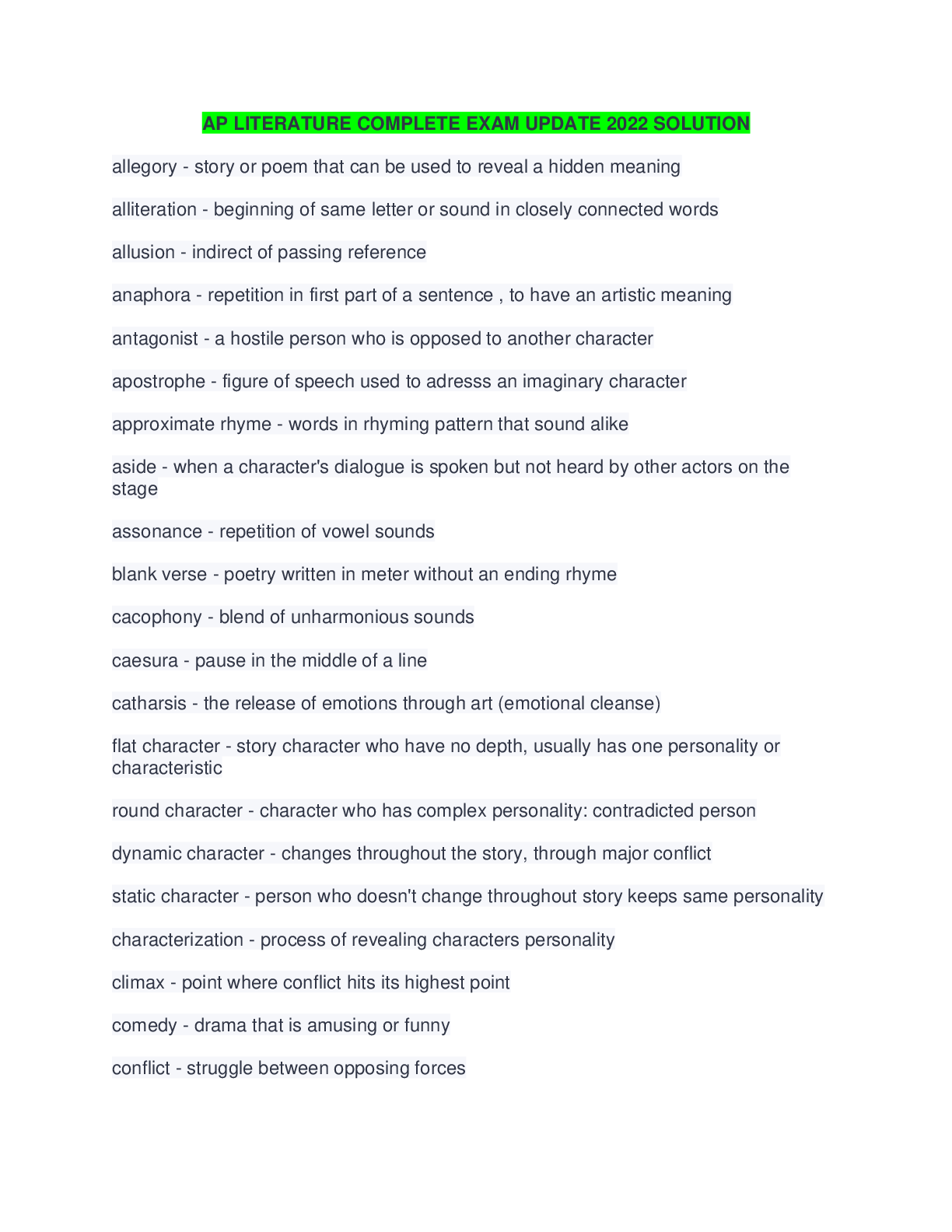

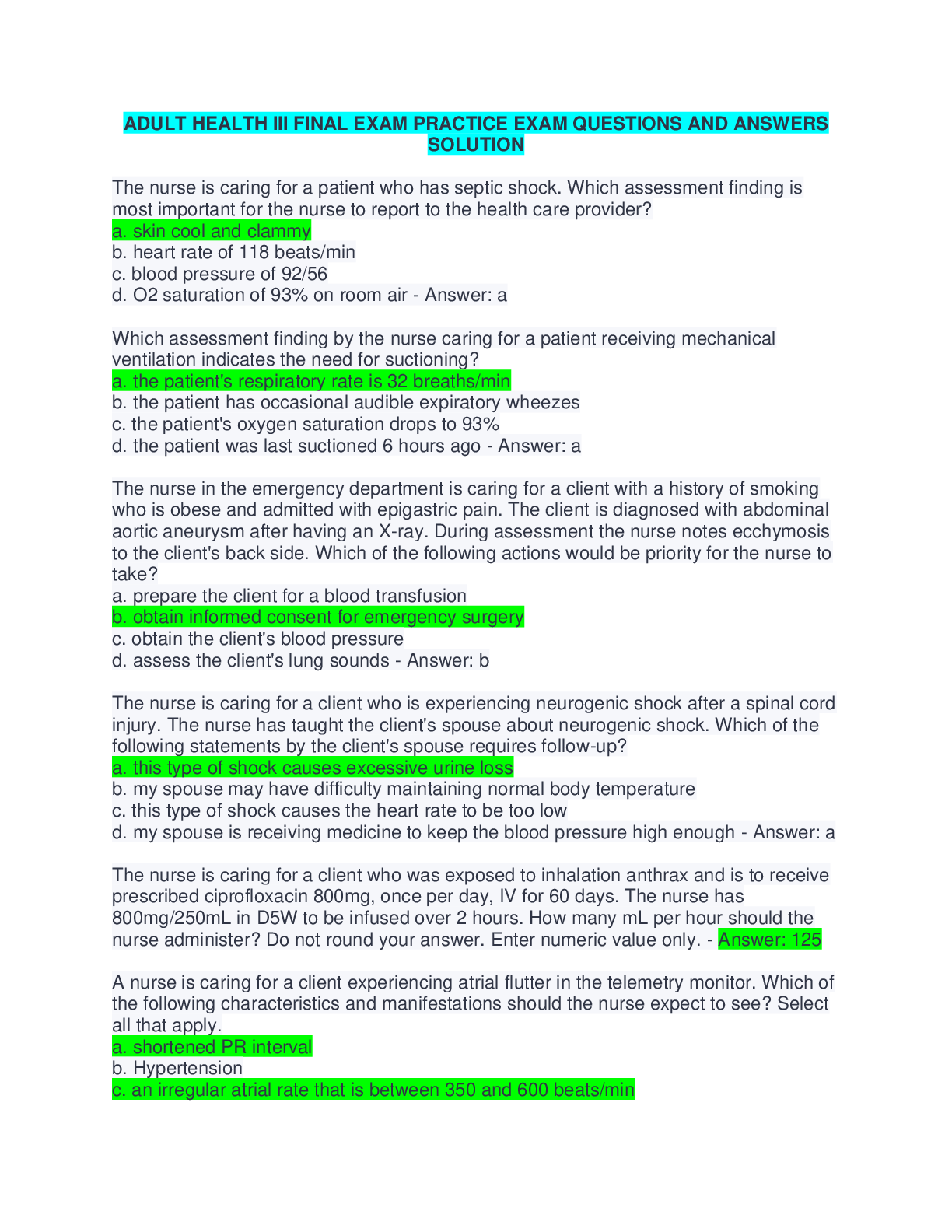

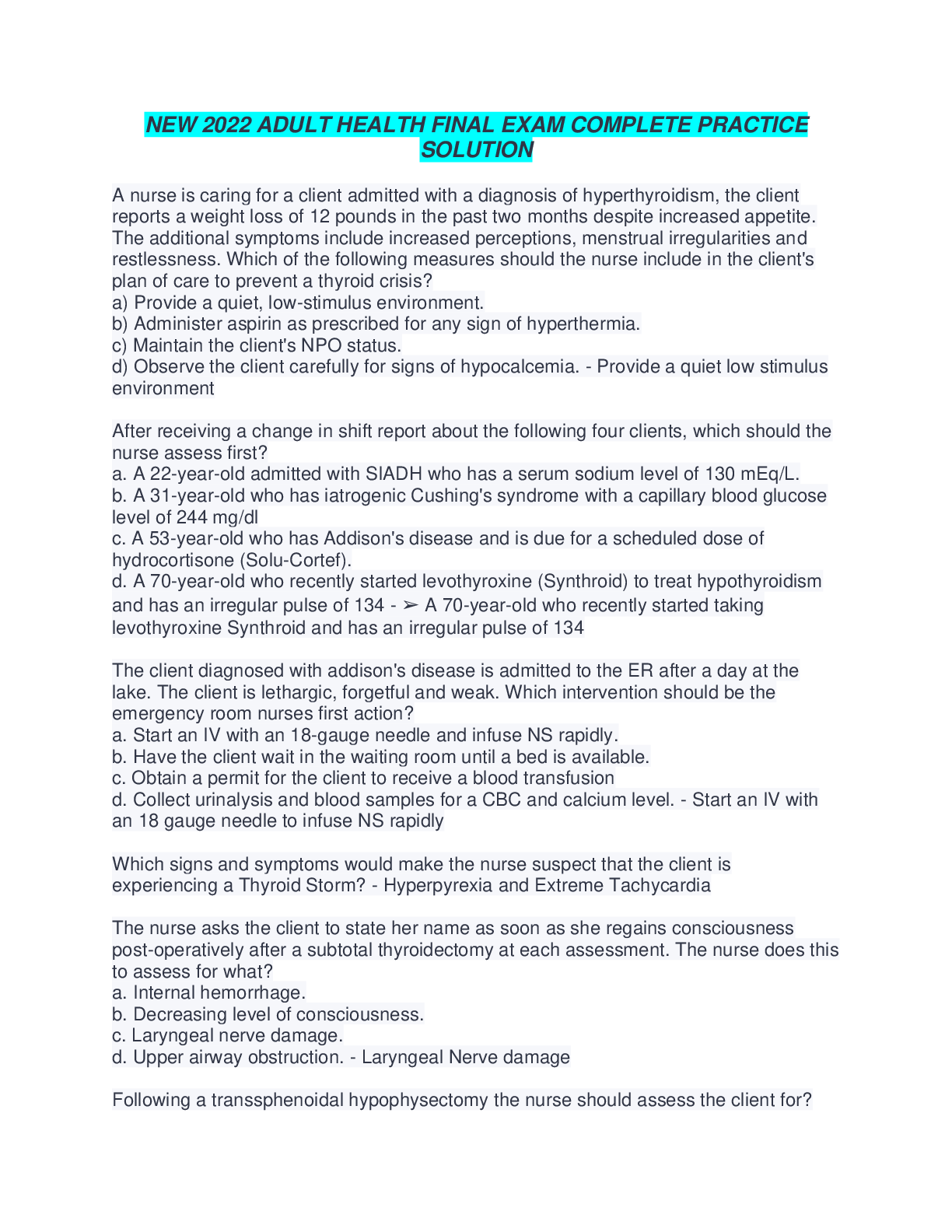
 GRADED QUESTIONS AND ANSWERS.png)
